SettlingUpon
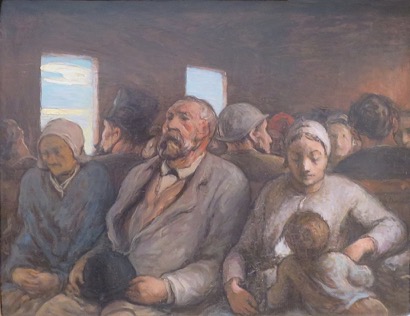
Honoré Daumier: The Third-Class Carriage (c. 1856–1858)
"Everything matters unless it doesn't."
SettlingInto eventually becomes a matter of SettlingUpon. The Muse has not quite settled upon the color palette she wants and the repainting cannot commence until then. I remain unsettled about several possible undertakings, so they're not started yet. As our SettlingInto has continued, the volume of SettlingUpons has grown. Dozens of little decisions define our way forward from here. We've successfully landed here but have yet to fully find our land legs. We're still a little wobbly, our way of living still emerging. Much remains unsettled and, indeed, unsettling so far. The SettlingInto might never end, but its infinity will most certainly be punctuated with a series of SettlingUpons. One day—not today, probably not tomorrow, but some day—these projects we've been envisioning forever will be over. Then we will have settled upon much. While our imaginations might have envisioned first class accommodations, we'll very likely settle for third-class passage and even manage to feel smug about our fortune, largely because we will have chosen, which makes a definite difference.
Deciding, though, proves challenging. I've long contended that choice serves as my chief superpower, if only because when I'm stymied, I can always at least choose again.
Quitting

Benjamin West: The Expulsion of Adam and Eve from Paradise (1791)
"Let him forever after be known as a quitter …"
I know myself to be a quitter, but a relatively inept one. In this culture, my culture, we revere starters, especially self starters, but look down through our glasses at quitters, with perhaps one exception. Those who've quit a dependence upon some reviled substance—demon rum, evil narcotics, or that devil tobacco—are held in some esteem for what those who've never been addicted imagine a certain depth of character. Of course it's that brand of character that came after a fall and was apparently inadequate to prevent the fall in the first place, but it's generally deemed worthy of a place near if not precisely in the hearts of the nation. Those who continue their abuse of substances sometimes get sent to treatment, which sometimes works. Others enroll themselves into twelve step programs which teach abstinence, acceptance, and forbearance in roughly equal measures, and consider addiction a life-long issue from which one might be recovering but from which nobody ever recovers. People who haven't had a drink in decades still consider themselves drunks and those who stopped using heroin continue recognizing themselves as junkies.
Addiction only somewhat involves a substance.
Routining

Giovanni Paolo Panini: Modern Rome (1757)
" … suggestively licking their lips when I forget to call them to table."
SettlingInto wasn't accomplished in a day. It might well never end, depending upon what The Muse and I choose to settle for. Settled, however achieved, seems mostly an emergent property and not a planned, predefined one. One arrives and only then decides, partly out of necessity, who they become. The context influences almost everything and the context didn't exist until we moved into it. We moved back in, but in name only. We actually found ourselves SettlingInto alien territory with only slight resemblances to what we remembered. Some better, some worse, some simply incomparably different. I've noticed parts of my old self reassembling here, parts I hadn't seen in action for years. Other aspects, ones I'd acquired or amplified while in exile, left me puzzling about just who has returned from exile. We have been, over the past three months, slowly and unsurely establishing routine. We've been Routining.
I'd forgotten how the former dreaded routine first came into being.
WisingUp

Michelangelo: The Libyan Sibyl (1508-12) from the ceiling of the Sistine Chapel
"A grain of insight seems worth the investment."
I seem to be getting no wiser as I age. The old adage about older and wiser seems to pair near strangers rather than inevitable partners. For me, aging, like learning, has proven to be more humbling than enlightening. Rather than great mysteries resolving themselves, they seem to grow ever more mysterious, ever less likely to ever come into sharp focus. By the time I've figured out something, I'm usually catching shadows. That thing's time has past, never to return. I might possess fresh knowledge, but almost always of an arcane variety, out-dated, the kind that would have been useful had I known it sometime in the past, but relatively useless in any imaginable future. My understanding of how this world works has accumulated much clutter and become less ordered than it was before I began acquiring knowledge. I seem to be on a glide path to die much dumber than I was born, and no wiser.
That opening declaration represents the extent of my accumulated wisdom thus far.
DownhillBothWays
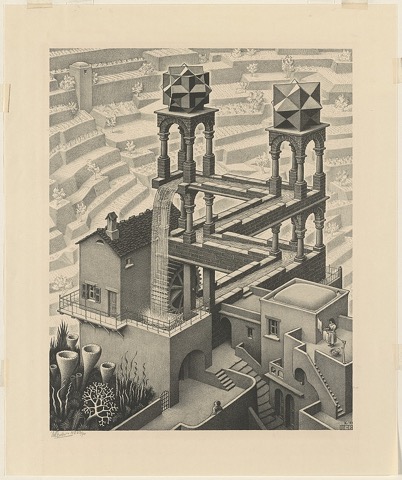
M. C. Escher: Waterfall (1961)
"I seem to be SettlingInto a place that's actually DownhillBothWays …"
I finally found a wrinkle in my schedule a couple of weeks ago and engaged in a few minutes of recreation. I pumped up the tires on my old coaster bike and took it out for a spin. I'd found an original front wheel bushing while on exile, so the nearly sixty year-old thing runs smoother than silk. I coasted down three blocks to the park, hung a downhill right which, three blocks, later left me at the big park. I hung a reluctant left onto what was once a road but is now a path and circumnavigated the central band stand before taking backstreets back to The Villa, a short and very sweet ride. The Muse asked how it was and I reported that it was DownhillBothWays. She wouldn't buy my story, but it was true to my experience. Riding these streets on this same model bike I rode as a kid, I remember torturous uphill stretches, usually encountered on the way back home after a particularly lengthy ride. Now, the city seems essentially flat, with no street steep enough to warrant any but my ride's single speed.
I might have gained some perspective and experience while on exile. …
MythConceptions
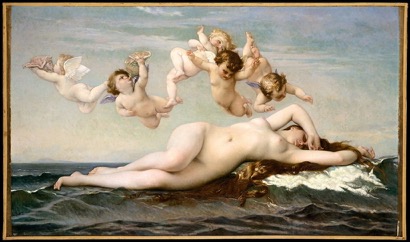
Alexandre Cabanel: The Birth of Venus (1863)
"It's not that the facts don't matter, but that stories overshadow."
We mistakenly believe that the ancient Greeks and Romans maintained the mythiest societies in history, but ours might far surpass theirs. No, we no longer believe in cloud-based gods, but the underpinnings of much of what passes for knowledge, even science, amounts to metaphors and analogies every bit as allegorical as any embraced by the ancients. Physicists searching for quantum gravity follow paths paved with stories, for little of what they seek can be observed with any of our senses, even those enhanced by machines. They twiddle concepts and conclude by means of logic and reason, their allegories growing simpler as they sense they're nearing their goal. Even science has become a faith-based initiative, easily discounted by those holding different MythConceptions and subscribing to orthogonal myth information. It's not that we don't share a serviceable language, but that we don't always share the same metaphors, the underlying stories which stand in as explanations of phenomena. No, atoms do not really resemble marbles, but they can be usefully thought of that way. The danger comes when we mistake our allegories for immutable realities rather than clever analogies, confirmation of what's proper to believe. Atoms couldn't care less what anyone believes about them.
I acknowledge that a significant portion of my admittedly meager understanding stands upon mythical shoulders.
SettlingUp

Jacopo Bassano: The Miraculous Draught of Fishes (1545)
"Whatever we own, owns us back better, such that we owe it forever."
The porch needed painting but not nearly as much as I needed to paint the porch. That porch needed paint when we slinked out of here twelve years ago, evidence of a certain dereliction of responsibility on my part. I was ashamed of that porch but not as ashamed as I was in myself. SettlingInto involves facing up to some past shortcomings and SettlingUp with them. I feel both humbled and fortunate to find myself in this position. Had we simply moved on without returning, these blemishes would have been permanent or, worse, someone else would have had to do my penance for me, like we did penance for the clown that sometime in the past expanded the kitchen. It was my sincere aspiration when we first took ownership of this place that I might prove to become a worthy steward of its heritage. That's meant considerable undoing of past violations of that heritage and also plenty of doing forward, improvements congruent to its bones. There are books, I imagine, keeping record of my stewardship's debits and credits. I hold myself responsible for repaying those debts, mostly in sweat labor.
Refinishing the porch repaid a long-outstanding debt, including considerable accumulated interest, a reason for genuine celebration.
Conspiracist
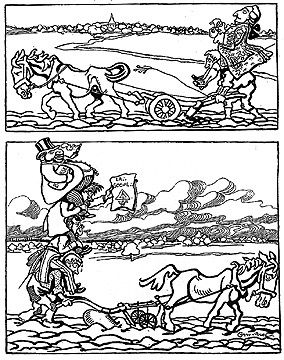
"French revolution: before and after: satirical drawing by French draftsman Caran d'Ache, 1898, in the middle of the Dreyfus affair and the foundation of Action Française. Although the Ancien Régime is not shown as idyllic, the contemporary situation is shown as an increase of oppression, which technical improvements (notice the plowshare) don't lighten, and to which financial capitalism (the banker with his top hat and his wallet), the Freemason (with his set square and plumb bob) and the Jew (with a curved nose) are contributors." (Wikipedia)
" … they, too, know not what in the Hell they're doing. Neither do I."
My neighbor Larry, a perfectly lovely family man with Bible verses posted on his front door, also has a dirty little secret he's a little too enthusiastic to share. We might be quietly conversing about his RV, which he uses maybe four times a year and has never felt competent to drive, and with which he's managed to a) back into a telephone pole, b) back into the door panel of a parked pickup, and c) pull the rear bumper off of after catching it on a gas station's concrete pillar, when his secret comes out. He keeps the RV because twice each year his family, now numbering thirty-five counting great grand kids, decamps to camp somewhere for a week and he and his wife need a place to sleep then. A man needs a certain amount of aggravation in his life, and for me, that RV might fully satisfy my minimum daily requirement, but Larry's little secret compounds his despair. You see, he's also a Conspiracist.
He might be dropping off a couple of dozen eggs, which he delivers gratis, from his chickens, and the topic springs up from nowhere. "If you just read the mainstream news, you'd never know that anything was going on, but they're trying to make us socialist. …
AMusing
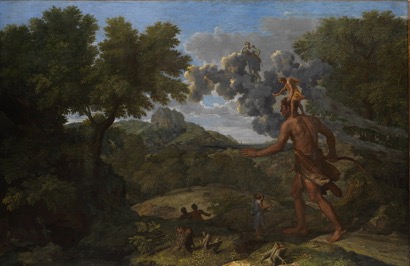
Nicolas Poussin: Blind Orion Searching for the Rising Sun (1658)
"Musing's almost never about actually discussing anything."
The Muse's frequent lengthy absences best typified our exile years. When we lived outside of DC, she'd spend at least a week each month in Colorado. When we relocated to Colorado, she'd spend about the same time away in DC. This left me out there on my own for what seemed like lengthy periods, often eons, fending for myself, batching it. I always somewhat reveled in that freedom. There I was all alone save for the cats, and out of view from anyone who might care what I did. I could sneak a cigar thinking that I'd likely recover before The Muse returned. I'd been domesticated so long that I would find myself out of practice and default to grown up status rather than revert back into adolescence in her absence. Those days seemed long and hollow, though, reinforcing my notion that good living demands that one somehow must be in service to another and not just to themselves. I'd reheat the bottomless pot of beans for breakfast, lunch, and dinner and never think of concocting anything more complicated or nourishing. I'd hold dialogues with the cats, bouncing ideas off them, continually asking them how they were doing in lieu of anyone asking me that question. That was a Museless existence, hollow and unsatisfying, rendering me The Invisible Husband.
She'd call, of course, more or less daily during her absences, usually on her way, a few minutes late, for her first morning meeting and/or in the final few minutes before falling asleep after an overlong day of briefings and a late sociable supper.
Asymptosis
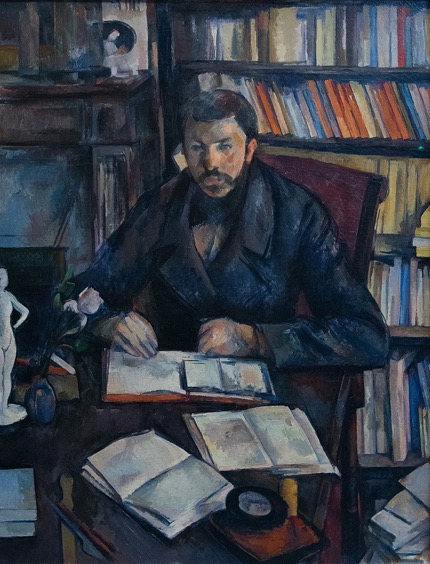
Paul Cézanne: (unfinished) Portrait of Gustave Geffroy (1895)
" … moments savored in the moment then forgotten forever."
I haven't accomplished much in this life, largely by design. I seem to possess a strong aversion to doneness, preferring to leave good enough unhassled by finishing touches. I tend to take things up to edges, but rarely over them. I much prefer starting new projects over gaining closure on any current one, so I usually abandon an effort in favor of an alluring opportunity, which I will also leave somewhat unfinished once it's close enough but rarely actually finished. I do not suffer from some curable illness or even an incurable one, for I consider my aversion to doneness a feature of my existence and in no way an encumbrance to it. It needs no treatment, though it does have a name. Perhaps it's just a syndrome, a special purpose capability reserved for an exceptional few, which, surprisingly, seems to include me. I'm not its victim and I do not suffer, but I seem to have Asymptosis, or it has me.
Always arriving without ever having arrived. Moving towards without actually crossing any finish line.
Withouting

Annibale Carracci, The Choice of Hercules (1596)
" … a fonder heart and a sometimes smarter response."
He who dies with the most toys loses whatever it might have been that toys couldn't satisfy. The toys might have successfully distracted the dedicated toy collector to the point where he never missed what he might have chosen to do without, though unfulfilled wishes might have provided bitter tastes of them. If he was true to type, he considered these shortages to represent problems that future acquisition might solve, though the desire in the dedicated toy collector never wanes for long after successfully adding another to his collection. He might miss a subtle point, one argued over for millennia, back probably further than recorded history can take us. My parents raised me a proper stoic, I guess, for I firmly believe that character might be best expressed by what one chooses to do without rather than by how much one manages to acquire.
Limited availability was one of the great attractions this small city offered. …
GrowingDown

Salvator Rosa: Diogenes Casting away his Cup (1650s)
"GrowingDown seems a just reward after failing to fully grow up."
I have been growing up for most of my life so far. I've tried to put down roots but with mixed results. Between attempts, I felt as if I was living in a planter, free to grow up, but restricted in how far down I could sink roots. I've experienced at least my share of transplantings, each traumatic, a few promising. My eyes were mostly on the sky, though, more concerned with seeing where I was going then delving into where I was growing. Aspiration can transport almost as thoroughly as physical relocation. Eyes on the prize do not see the present and one can live much of a life somewhere else, head if not actually in clouds, focused there. Trajectory seems calculated up to but not actually into any destination. Careers, marriages, aspirations easily focus upon advancement rather than placement. Where am I? seems less interesting than Where I am going, intentions too easily supplant presence. I'm intending to go nowhere now. I'm SettlingInto here, finally GrowingDown.
Growing up seemed a succession of passing throughs, each pause more of a layover than an arrival.
ClutchYerChange

Paul Cézanne: (unfinished) Portrait of Gustave Geffroy (1895)
" … moments savored in the moment then forgotten forever."
I haven't accomplished much in this life, largely by design. I seem to possess a strong aversion to doneness, preferring to leave good enough unhassled by finishing touches. I tend to take things up to edges, but rarely over them. I much prefer starting new projects over gaining closure on any current one, so I usually abandon an effort in favor of an alluring opportunity, which I will also leave somewhat unfinished once it's close enough but rarely actually finished. I do not suffer from some curable illness or even an incurable one, for I consider my aversion to doneness a feature of my existence and in no way an encumbrance to it. It needs no treatment, though it does have a name. Perhaps it's just a syndrome, a special purpose capability reserved for an exceptional few, which, surprisingly, seems to include me. I'm not its victim and I do not suffer, but I seem to have Asymptosis, or it has me.
Always arriving without ever having arrived. Moving towards without actually crossing any finish line. …
Infinities
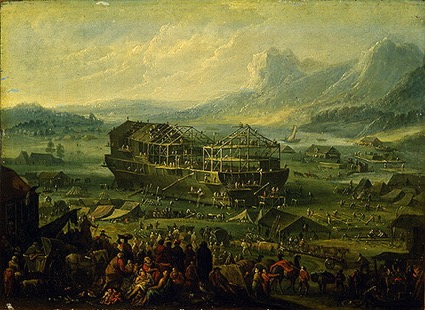
Franz de Paula Ferg: The Building of Noah's Ark (ca. 1730)
"I might most become myself there where my usual controls and inhibitions hold little currency."
After eons of prep work, The Porch stands ready to accept paint this morning. By day's end, if I'm lucky and diligent, I might replace the hanging fuchsia baskets, move the geezer rockers up from the gazebo (geezerabo?) and get on with fresh Infinities. This job, so simple-seeming at the start, turned complicated as soon as I set my hands on it. Ain't that the way of this world? Even small distances mislead both eye and imagination and large distances mislead even more. From exile, I easily imagined myself cutting through one SettlingInto job after another, like the proverbial hot knife through soft butter, but up close and intensely personal, gravity influences more deeply. Physics asserts her immutable laws and a perfectly acceptable naive notion turns into another Infinity. Infinities appear when it starts becoming clear just what an effort might actually entail. Some grand complication comes into focus and the timeline goes to Hell. I suddenly don't quite know how to accomplish what I'd set out to finish and I've already started. No way to turn around and not start then. I'm committed to what first seemed like a finite effort but which now seems infinite. The Infinities have found me.
My father, who, if anything, was a most dedicated worker, taught me how to deal with Infinities.
SlideEffects
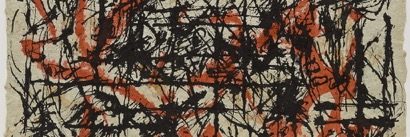
Jackson Pollock: Untitled. (1953-54)
"Sometimes SlideEffects trump everything else."
Back when we still watched television, I found amusing the many adds for various prescription drugs. Some government agency still vaguely interested in truth in advertising—a concept so long considered not worth considering that I found these ads quaint—insisted that each ad list prominent side effects, which tended toward the shocking. Who wouldn't agree to take a medication likely to effectively treat some skin condition even though it might also cause permanent paralysis or one of the more dreadful forms of cancer? The tradeoffs never seemed to make sense, the side effects just too bizarre to accept the risk, however slight, since slight risks apply to large populations, not to the individual who experiences them. My mom, bless her dear departed heart, gained the reputation of only exhibiting side effects and not usually the primary intended effect of any medication. Her doctor prescribed using a form of Reverse Polish logic to achieve intended outcomes.
Economists call them externalities, the sideshows that tend to pop up around any primary intention.
Evening

JAN BRUEGHEL THE YOUNGER: The Garden of Eden (1635)
"We're shadows glowing within this forest."
First week of June, Evening arrives as an actual breath of fresh air after another blistering afternoon. The house, closed up since late morning, suffocates by then and supper seems unappealing enough to just cancel it. The heat exhausts me without my having to exert anything and leaves me feeling worthless, hoping for morning. The Muse suggests a walk out into the Evening air, and I cannot concoct an excuse to refuse her invitation. I check to find Molly ready to come in from the back deck, I don my walk-in' shoes, and we depart into gathering darkness. The evening feels like velvet on my face. The sidewalks still hold traces of heat and the shadowy yards still show off, in silhouette rather than in full glorious color. The difference leaves them seeming magical. Flowers appear first by scent then by outline. Even without evident color, they seem strangely intact and instantly recognizable. Whomever left their hose stretched out across the sidewalk overnight deserves a stern talking to.
We're all alone, save for one gentleman out watering his roses and a young woman walking her dog.
Kickin'

Late 19th-century photograph of a yamabushi fully robed and equipped, armed with a naginata and tachi.
K. Ogawa: from KAZUMASA OGAWA - Military Costumes in Old Japan,
Photographed Under the Direction of Chitora Kawasaki of Ko-yu-kai (Tokyo Fine Art School), Tokyo, 1895 (Meiji 28)
" … while we're still alive and Kickin', we're all in."
Ask me how I'm doing and I'm likely to respond by saying that I'm still alive and kickin', kickin' apparently being an inseparable part of living. We unquestionably inhabit an addicted society. It might be that once adopting the language of addiction, we began noticing just how attached we'd been, or maybe we are all just addicted to something, whichever, we do seem to be continually occupied with trying (and often failing) to get over or along without something that's insidiously worked its way into our lives. We imagine ourselves free and clear but struggle to find a path between here and there. We aspire more than succeed, it seems, and so consequently well-understand what losing feels like. In our insistence upon winning, we perhaps most often set ourselves up to lose, which gives us almost endless opportunities to forgive ourselves for turning out to be human, albeit more human than we ever intended to become.
I might work just as hard to create my habits as I do to break them once they become bothersome, maybe even harder, for there's a certain satisfaction, a genuine sense of mastery, when teaching myself to master a fresh dependency, with little sense that it might one day grow to master me.
Porching
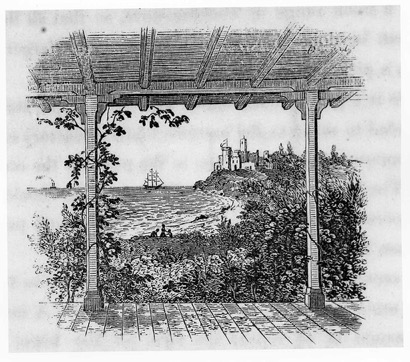
Anonymous: “Bracketed Veranda from the inside,” in A. J. Downing, The Architecture of Country Houses (1850), 122, fig. 45
[A typical picture of a porch, which includes almost no porch and almost all view.]
"A porch could do a whole lot worse than get repainted."
A man could do worse than paint his porch. It's picky work, under-appreciated effort, invisible to all but the man who could do a whole lot worse than paint his porch. It's knee work. Not an ounce of any standing in it. It's demanding work of the sort that seems to goad a man into taking shortcuts and calling not quite right good enough. A man could do worse than ignore those seductions. A man begins by convincing himself that the finish just needs a little feathering but does not finish until he's scraped and sanded some boards back to their original state. Nobody will notice and nobody should. It's a covenant between this man, who could do a lot worse, and his porch, who knows it doesn't deserve it. He'll epoxy that rotted spot where the railing once anchored. Once painted, nobody knows except the man who could do worse and the appreciative porch, until some other man, who could do worse, sets about to paint his porch again.
Our porch is about 90% perch and 10% entryway.
Mournings

Peter Paul Rubens: The Lamentation (1614)
" … forever rooted in our forebears' and lost daughter's."
Mornings here taste as sweet and cool as a freshly-picked strawberry. However blistering the sun promises to become later, he starts the day with a cool head, in no apparent hurry to prove any point. The yard always finds dew overnight and releases it slowly to create a lush sense of enoughness. The roses bloom with ferocious intensity, colors screaming passionately. …Is a rose, indeed. Names inevitably understate identity. None of us were ever what we were called. In the town cemetery, the stones hold more than mere names and dates. They hold stories, unchanging through decades, varying only in tiny emerging details. My great great grandmother will always be the fifteen year old whose guardian aunt granted permission for her to marry that hapless ex-Union soldier who had been mustered out on a medical discharge after missing his first and only battle. Born in the eighteen forties, she would see the nineteen forties before departing, a lifetime spanning antebellum to anti-aircraft guns, The Oregon Trail well into the Age of the Automobile. Her story's stabile, though her stone's almost unreadable now.
SettlingInto allows us to visit our forebears.
Tidying
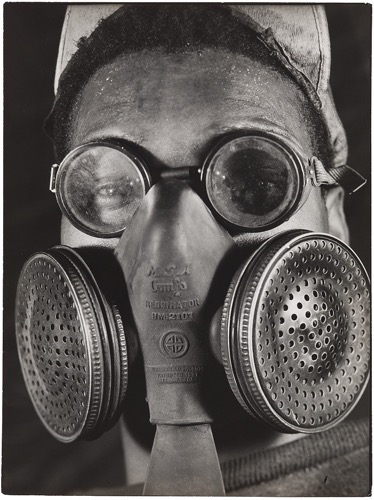
Margaret Bourke-White: "Atomic Number Thirteen" (1939)
"No longer simply SettlingInto, but here, home at last."
Nine weeks into this SettlingInto saga and we're still beset with boxes. Each week, we make a little headway, but after the earliest days, unpacking has remained an intermittent element of our lives here. I chose to leave my library in boxes until after repainting and flooring work's completed. I didn't relish restocking shelves just to have to tear them down again in a few weeks or even a few months. Consequently, we've developed blind spots. One opened box has stayed in the same place, half unpacked, since the early days, so long that its presence has become normal and therefore invisible. No urge to finish the job overtakes either of us. We hold higher priorities. The Muse invited a couple over for supper and insisted that we tidy up the place in preparation. I sensed a fierceness behind her request for a little help, knowing that I would be in for something. She jumped in before breakfast, focused. I joined in later, but since I was cooking and she, alone, held the grand intention, I got off easier, just vacuuming and cleaning my bathroom. Nine rooms and a grand staircase later, I felt less like a slacker. The only way I could imagine cleaning the shower was to take off my clothes and clean while showering, a semi-humiliating resolution.
The Muse reorganized the kitchen (again) while cleaning it. I found space to more permanently place clutter thriving on our inattention.
Tending
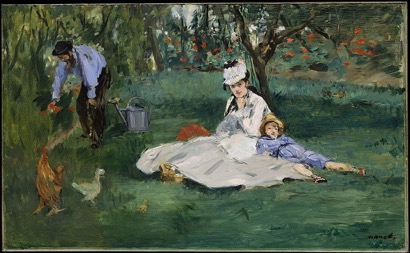
Édouard Manet: The Monet Family in Their Garden at Argenteuil (1874)
"I'm now blessed with the sacred obligation to tend what we built …"
I think of myself as a caretaker. Now that The Muse and I have largely reclaimed the yard, which really needed very little real work to reclaim, now that Planting's pretty much concluded, Tending time arrives. Sure, odd corners still remain enqueued for my attention, but a proper garden retains some wild uncultivated and uncultured space, for balance if for nothing else, a touch of Wabi-Sabi in the mix. The Muse disagrees with me on this point, not necessarily philosophically, but practically. The wild corner could get out of hand, but then a caretaker like myself understands this, too, and keeps a watchful eye. I hold no grand plan for Tending our garden and I've yet to solidify any routine, other than to remember to water the front porch fuchsias and the kitchen garden. Everything else might be capable of taking care of itself, or so I tell myself lest I feel overwhelmed by my budding obligations. Nobody else in this world is capable of Tending this particular garden, and truth told, not even The Muse knows the rhythm of this place as well as I, for I accomplished more than designing it. I scraped and scratched and schlepped this yard into creation. The yard taught me how to tend it as I worked it.
Ten thousand little cues only hinted at what this garden needed, and I'm still learning how to read the cues remaining.
Lightening...s

El Greco: Allegory: Boy Lighting Candle in Company of Ape and Fool (1589-1592)
"I feel delighted just being here!"
The light never leaves for long this time of year. By four in the morning, the eastern horizon already stands clearly backlit with promise. Darkness has not yet overtaken the yard when I stumble out to close the garage door after supper, after nine. Days last nearly an hour longer here then did Front Range and DC days, and nights barely settle in before roused and on their way again. Late afternoon light grows fierce and we flee to the shady backside of the place once we've fetched the afternoon paper. I sit beneath the sacred apricot to relish the softening evening arriving. The cats follow the sun through the day, usually choosing the sunniest spot to warm their rapidly shedding fur and wait for The Grand Other's after school arrival and afternoon treat time. Light keeps about the same hours I keep here and throughout our exile, I never adapted to more southern latitudes' spring and summer days, hot, humid, short, and stingy with light. I suppose the lightning bugs were compensation, charming yet inadequate.
My readers have commented that my writing has taken on a lightening since I started SettlingInto here.
StumpThe

Wassily Kandinsky: Composition X (1939)
"The checker might come to recognize us coming and feel the compelling need to take a break just when we're ready to check out."
I know myself to be a mystery to myself. Not a complete mystery, but enough of one to occasionally leave the detective puzzled, a real head-scratcher. I often wonder in vain, resolving nothing before deciding to just move on to the next thing in line. I work diligently, like a bee, but with little sustaining purpose. I don't, for instance, write four books each year to sell four books each year, but apparently for no ultimate reason at all. I often engage as a simple matter of form or custom. I'm unsure why I decide to mow my lawn just so, it just seems proper to do so, and so I dedicate a part of myself to replicating that pattern. Routines stick in my head and if I don't wake up dead, I'm engaging with them before the sun starts showing each morning. I flop down into fallow hours, too, apparently without good reason. The Muse might find me not exactly napping mid-morning and ask if I'm feeling okay, and I am but something's taken over my mind and I feel compelled to noodle it to ground. I'm unsure why. I frequently stump myself. I could be both the guest and the panel on What's My Line? and feel just fine about that. I'd guess correctly about the same percentage of the time as the real panel might, and wrong often enough to keep the proceedings entertaining.
The Muse and I play a game when we're shopping, one in which we enlist the hapless checker without asking.
Whinering
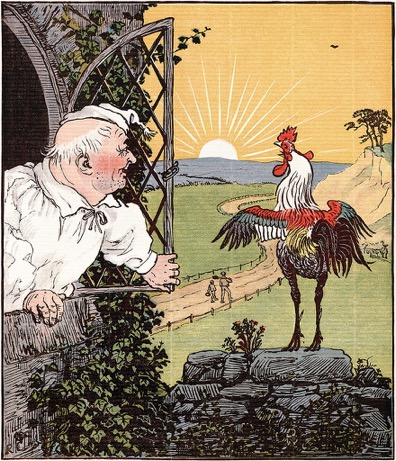
Randolph Caldecott: Illustration for "The House that Jack Built", from The Complete Collection of Pictures & Songs (1887)
"I'm not sorry for this understanding."
I have a confession to make and an apology to offer my loyal readers. I confess to being an inveterate, though largely closeted, whiner. I'm apt to whine like a petulant five-year old when stymied or otherwise overwhelmed. I'm an embarrassment to myself, especially when my whining slips out in public, such as here, yesterday, when I described my Sequencing challenges. I sincerely apologize for my unseemly behavior. A man my age should be able to hold his water with more dignity than I displayed. In way of explanation, not in any way trying to excuse my outburst, I might explain what my insolence seems to be teaching me. You see, later that day, after letting my frustration fly, I set about organizing the very workbench I'd earlier maligned. I might ascribe my sudden turnaround from stuck to productive as an accidental convergence, though I'm seeing more of a pattern than an isolated incident emerging. It seems to me that my Whinering might have been if not causative, perhaps a pivotal piece of my sudden turnaround. It might have been that once I'd so improperly expressed my frustration, even proclaiming it a normal and perhaps necessary element of any half-decent SettlingInto, my stuckness spell seemed broken and I could proceed less encumbered. My growing self-disgust with my stuckness grew until the stuckness could no longer support itself. My petulance paid off.
I might have found a less publicly humiliating way to chase away my frustration. I usually do,
Sequencing
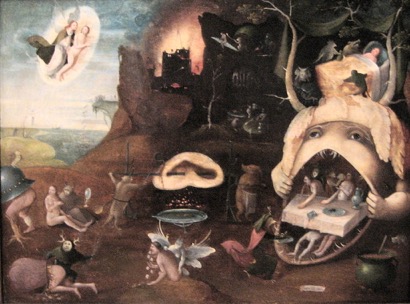
Followers of Hieronymous Bosch: The Vision of Tundale (circa. 1520–30)
"I am eating my own dog food."
Back when I taught my Mastering Projects Workshop, I was taken by how casually project sponsors tossed around their project's "vision." I came to call them All Ya Gotta Do Injunctions because they inevitably misrepresented underlying complexity, as if merely spreading wings enabled flight. I tried to prepare project workers for the types of tangles they'd likely encounter when (never if) they tried to nail down these flippant notions into some achievable form. The Muse called these "visions" dormatives, after Gregory Bateson's word for vacuous terms, those dripping with only apparent meaning but lacking any practical interpretation. One can tie one's self up for ever or longer trying to achieve best or deliver to a dormative request. It always becomes an act equivalent to poking a stick into a hornet's nest when trying to transform any visionary demand into something physically possible to produce and, generally speaking, a fool's mission to intend to satisfy its author with any result. Delivering any vision always turns into somewhat of a nightmare, and one of my intentions when creating Mastering Projects had been to help prepare participants to face this simple fact. Project work ain't no bed of roses.
It's one thing to know for certain what always happens but quite another to experience this predicted effect. In fact, forewarned serves as little protection against effects in execution.
Anvernursery
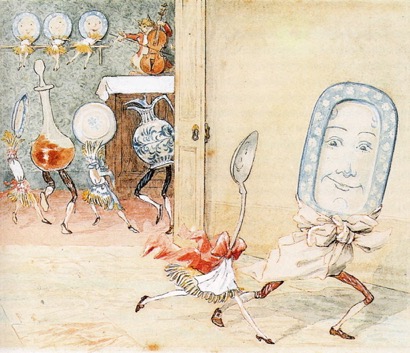
Randolph Caldecott: "And the Dish Ran Away with the Spoon",
from Hey Diddle Diddle and Bye, Baby Bunting. London:
George Routledge and Sons. (1882)
"Pups, not Big Dogs."
The Muse and I were married on this day nineteen years ago. This day lives in the opposite of infamy for both us and our families. We remember it as having been a perfect celebration, one of those gatherings where everything fell perfectly into place. More important than our logistics working out, albeit with considerable improvisation, we'd designed the ceremony as an act of community, not merely a presentation. Rather than simply inflict our wedding on anybody, we invited everyone accepting our invitation to find something to contribute, some means to engage such that they might feel as though they were more a part of the business than mere witness to it. I'll never forget The Muse's aged Aunt Lillian cleaning up the ferns alongside the gazebo or the last minute run Rich and I made to a local nursery to buy some mulch, for cripes sake, to clean up the pond border. We'd invited our friend James to fly over from Seattle to chef the festivities and The Muse's sisters, each accomplished in the kitchen, pitched in, though if I remember correctly, James in his role of chef at times took that big knife he held a little too literally.
We bought whole Copper River Sockeye Salmon and flats of local strawberries and about a ton of fresh asparagus and spinach, all sourced that very morning from local growers and suppliers, the menu as representative of the season in this valley as was ever devised.
Dreading
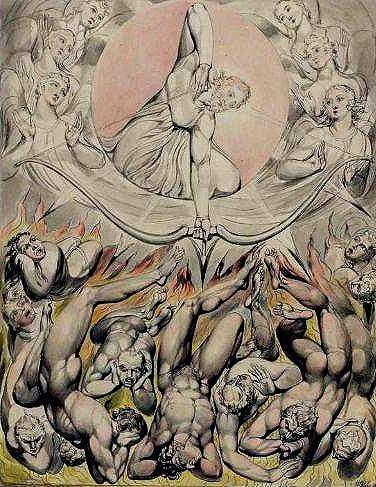
William Blake: The Casting of the Rebel Angels into Hell -
illustration to Milton's 'Paradise Lost' (1808, pen and watercolour on paper)
"One day I might come to behave as I know I should."
Dreading serves as the primary moderating force in my life here. Were it not for Dreading, I might run rather roughshod into every opportunity, and only fools ever run into opportunities or burning buildings. I tell myself that I'm "considering" or "planning", though I'm really quite actively procrastinating, albeit in a decidedly passive-aggressive manner.
I did not really want to replant those tulip bulbs I'd removed when weeding out the front walk garden beds, the work just needed doing by someone.
PuttingUp
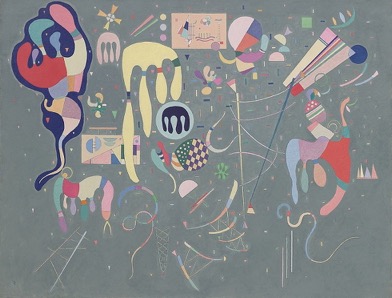
Wassily Kandinski: Various Actions (1941)
" … partly just reward and partly well-deserved punishment …"
Any half-decent exile includes much hopeful longing, many if-onlies. "If only the damned deer weren't everywhere, we could have a real garden instead of this make-shift deck one." If-onlies provide a valuable service. They keep open active aspiration, which proves incredibly nourishing to any soul feeling stranded on a seeming desert island. Some exile years utterly depend upon longing to remain survivable. Dreams predominated some months, delusions, others, but overall, we experienced exile as a sort of out-of-body experience. We compensated by perhaps over-inhabiting our future and under-appreciating our present. Now that we're back and SettlingInto, we no longer have the option of living so far ahead of ourselves. We've entered a stage where the primary barriers to our dreams coming truer lie in our hands and not just an indistinct future's. We've entered the Put Up or Shut Up stage of dreaming. Nothing's any longer sufficiently resolved by talking about what we intend to do, but only by accomplishing something. Sure, excuses still cling and linger. After a dozen years gone, even those newer habits seem hard-ish to break, but it's now our job to take those reins and ride for all we're worth. We're in The PuttingUp Stage.
It seems fundamentally unfair to criticize any action I was not directly involved in, not that, like anyone, I haven't frequently engaged in this.
Plantings

Pacino di Buonaguida: Illuminated manuscript detail of a miniature of a garden or flowery field referring to 'Prato' in Tuscany. (circa 1302-1343)
" … fresh beginnings rather than an irreparable ends."
SettlingInto roughly divides into stages which only become distinct later. In the moment, I find myself focusing upon the body of my present effort without very much considering whatever comes next. We created no grand master plan, not even a sketchy one, preferring to follow feelings or intuition or something to produce an emergent garden. God creating Eden was probably no different. This strategy leads to what might have been predictable blockages in the flow, encouraging certain discontinuities which appear as surprises which might delight or frustrate. A few days seem inevitably lost to gear switching, simple confusion, or natural hesitancy. I tend to get lost sometimes, and not just garden variety lost but the second-order kind where I'm not only lost but also lost to the fact that I'm lost. This past week, the tracks have been throwing off a few sparks as if my smooth running train might jump its rails. Soil preparation, the digging portion of the production, essentially done, it came time for planting and I caught myself hesitating, even procrastinating in the face of this fresh phase. We consequently find a backlog of plant purchases piling up beneath the apricot tree awaiting placement and, as usual, this situation seems to be all on me.
I suppose that a skilled therapist might find my hesitancy's root cause.
MidnightCreeping
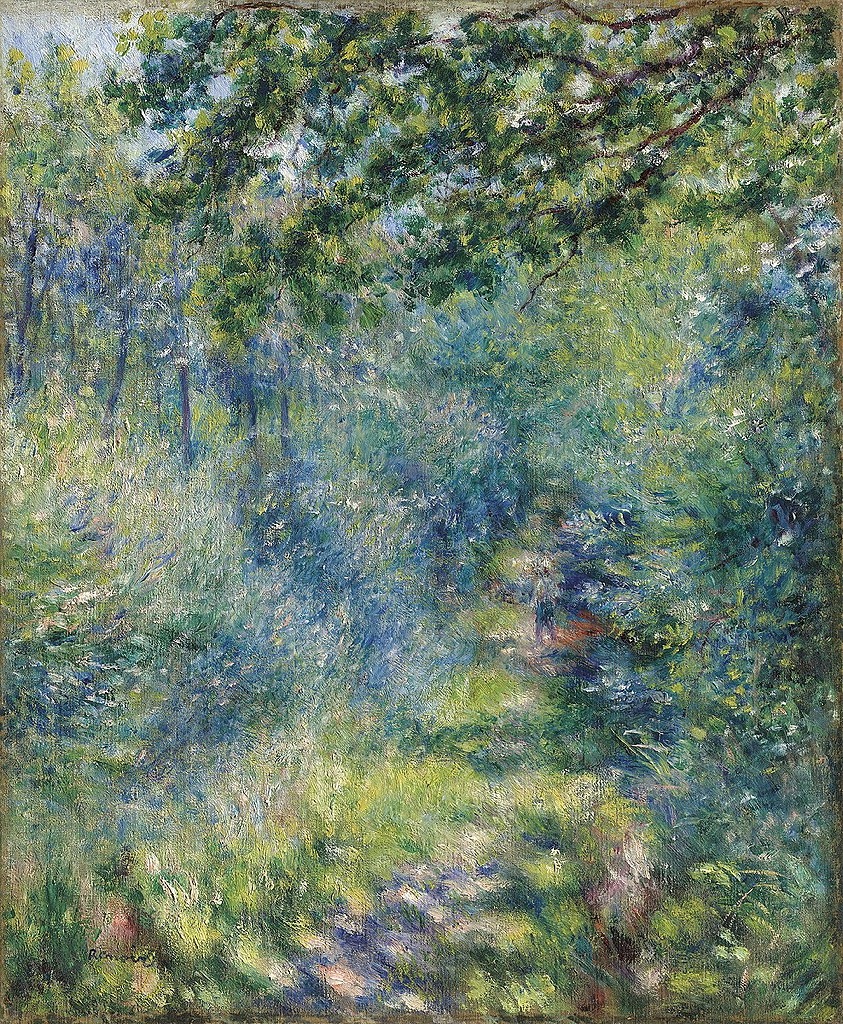
Pierre-Auguste Renoir: Sentier dans le bois (circa 1874-1877)
"I have other habits which overtake me sometimes and drive me to commit equally minor crimes for all the very best reasons."
I would have pleaded passionate excess or perhaps temporary insanity, for had I been arrested in my youth on May Day, I would have most certainly been guilty as charged. No, I had not participated in any violent protest on that day or bumped off a bank. I would have probably been charged with some form of criminal trespass for sneaking into some fortunate soul's yard around midnight for the purpose of liberating a few of his choicer flowers. May Day reminds me of this once perhaps over-proud tradition which I practiced with diligence and without supervision for well over a decade. Before I had my own gardens, I'd one night each year take it upon myself to swipe a few of another's excess blossoms to craft a May Basket for my love. It would be a simple thing, often crafted from a page torn from a notebook or a cut down paper bag, but it would mean something. It would mean that I'd risked my freedom to express my ardor. It would mean that I had not forgotten. It encouraged the sort of domestic tranquility only ever known by hardened criminals who'd made a clean getaway. I'd return to my innocent ways in days following and stay on the proper side of the law until over the night before the next May 1st. I was a studied recidivist.
The Muse and I now count ourselves among the fortunate souls who have a yard overflowing with flowers on May 1st.
Hoops

Wassily Kandinsky: Squares with Concentric Circles (1913)
"I'll retell the story often and bore everyone but myself with it."
The Bakery closes at three pm on Saturday and does not open again until 8am Wednesday. It's worth the wait, but its eccentric schedule makes it impossible for me to get fresh bread on a whim. I need to plan ahead. Similar story with the butcher, who closes Sundays and Mondays. The greengrocer closes at six on Fridays, opening again at 7:30 Sunday morning. I can always head for one of the godless supermarkets where I have to settle for something mass produced, but I'd rather support the local operations worth frequenting, so I maintain an ever-increasing number of special calendars. The nursery's open Sunday in season, but closed both Monday and Tuesday. The other nursery's closed on Saturday but otherwise open every day. County offices close at 4pm. Nobody keeps regular hours anymore.
SettlingInto demands some jumping through such Hoops.
StrangeAttractings
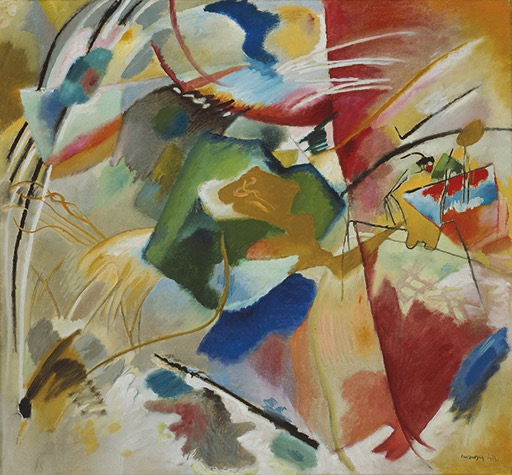
Wassily Kandinsky, Painting with Green Center (1913)
"That whereof we cannot speak, thereof we must remain silent." Ludwig Wittgenstein
" … all influence, no substance."
Were I to follow Wittgenstein's advice, I wouldn't say much. Many might argue that this outcome would seem far superior to the present alternative, myself included some mornings. I have felt moved, however, to attempt to consider some StrangeAttractings SettlingInto sparks, though I hold no clear description or cogent explanation, for their presence seems real enough to attract me, though the particulars continue to escape me. I suspect that I'm engaging with some sort of field here, that the strong sense of an abiding absence during exile, even though I continued to remain just as present there as I ever had been anywhere, just in a different location, was the result of mysterious forces or perhaps a field. I came to feel at home-ish even there, but never felt precisely home. Each place felt more like a rented room encased in finite time, temporary and impermanent. I only ever laid down shallow roots there, though the soils eventually became familiar, as if they were mine, but only for a season. I felt the transplant there, able to survive but not to thrive. Equatorial summers and arctic winters reminded me that I never would become a native. Here feels different and always has, but I cannot explain that difference, not even to myself. I say, half in jest, that gravity just works right here, though I remain dead serious about that statement.
I think it both hilarious and ironic that the field of physics, the study of physical properties, has increasingly become a field of philosophy.
Doctoring
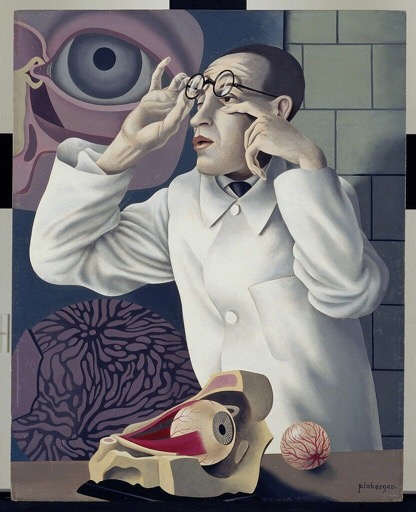
Herbert Ploberger: Self-Portrait with Opthalmological Models [Selbstbildnis mit Opthamologischen Lehrmodellen] (1928-1930)
"I'll hope for continuing good fortune …"
I'm the guy on which insurance companies make their money, for I have been blessed with generally good health. I exhibit no chronic conditions. My joints remain serviceable. I stopped smoking before it got me, so far at least. I ascribe my condition to a raft of very likely mythical causes. I avoid sodas and always have. I decaffeinated myself at 35, figuring I had better things to do with my body than rev up its engine. I avoid fad diets and acknowledge no allergies other than a recently encroaching one to cats, which I generally deny to myself. I have my faults and hold them close, figuring that they're nobody's business. I'm probably mentally unstable, but what sane person isn't, these days?
That said, I have generally avoided visiting doctors.
ConnectingInto

François Boucher: La Pêche à la Ligne (1757)
" …something deeper and somehow more permanent than just another pedestrian passing."
Shortly before we left our exile in Colorado, I searched for someone to remove a tree on our property. Not personally knowing anyone in the tree removal business I resorted to a Google search which connected me to a service which reminded me what I despised about exile. Without even clicking any links, I had apparently been spotted searching. Within minutes, I received three calls from tree removers volunteering to stop by and provide a free quote for completing the work. I agreed to one fellow's offer and a few minutes later, it couldn't have been more than a half hour, he was in my yard inspecting my tree. Shortly after he left, another guy drove by and, seeing me in my yard, stopped to introduce himself as an expert tree remover. I asked how he found me and he clued me in. He subscribed to a referral service called HomeAdvisor® which provided him leads, at twenty-five bucks a pop. I replied that I'd not requested any service, that he was the second tree remover to just show up. This pissed off the tree guy since he was out twenty-five bucks for a false lead. I promised to call someone to complain for him, but when I called, I connected with just another victim of the pyramid scheme, who worked innocently following leads from he didn't know where. He received a cut of something for each lead he passed on. The whole system seemed astoundingly anonymous and bloodless, relationships without all the bother of relating to or with anyone else, hands-free handshakes.
I decided not to remove the tree.
Catpanions
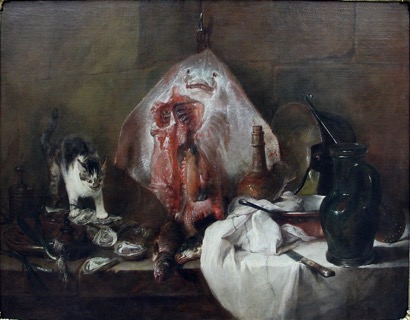
Jean Siméon Chardin: The Ray (1725–1726)
"They always greet our returns like delighted children …"
Our cats Max and Molly received the worst of the move. While The Muse and I just had to drive familiar cars for two days, the cats had little car traveling experience and much less predilection to enjoy it. I drugged them with kitty CBD, a cannabis derivative advertised as a mild sedative. It worked, perhaps too well, for they both experienced zombie passages, hardly themselves, with Max crashing hard and Molly uncharacteristically cuddling close with her head in my lap. Both refused breakfast, even kitty treats, after our Ogden overnight, and Molly fought like Hell to avoid returning to her carrier for the walk back to the car. Both survived the trip.
I imagine that for them, our arrival must have seemed like landing in Oz.
Plumbering
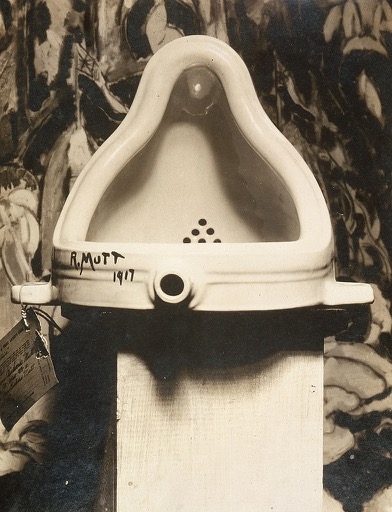
Marcel Duchamp: Fountain (1917)
photograph by Alfred Stieglitz at 291 art gallery following the 1917 Society of Independent Artists exhibit.
"How terribly innovative!"
The First General Rule of Innovation states that the more convenience any innovation delivers, the more difficult that innovation must be to fix should it break. Innovations always eventually break and when they break, they exhibit enantiodromia, the tenacious tendency for things to turn into their opposite. Great convenience becomes even greater inconvenience. Years of steadfast duty erases in an instant, replaced by dread and frustration. Once revered, twice feared and forever thereafter reviled, for the user sees behind the curtain and begins to understand that the innovation only amounted to some well-disguised sleight of hand trick and not really a marvel of modern technology at all. Underneath, it's generally nothing more sophisticated than two sticks rubbing together, and often much, much less. I present our shower faucet as Exhibit A in my argument.
Of all innovations, innovative plumbing tends to fail most spectacularly.
ScalingInto
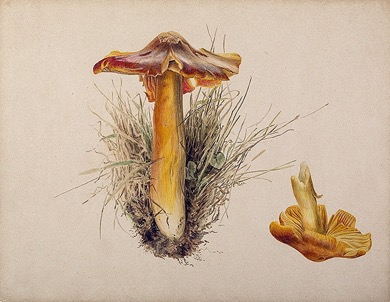
A study of Hygrophorus puniceus, one of the many watercolours of mushrooms created by Beatrix Potter (Circa 1897)
" … only ever really experienced by accident when actively not finding whatever you were seeking."
We tell people that we're going up to hunt morels or pick wild blackcurrants, but we're really ScalingInto. The forests here have not made anyone's top ten lists, thank heavens. As Western forests go, they first appear rather pedestrian, neither imposing nor particularly vast, trees of a uniformly modest size. Fires have ravaged but left lots, little of any of it virgin. Peaks tend toward softly rounded rather than starkly spired and by mid-May, few remain snow-covered. There's a softness to the place not immediately apparent. These woods come into focus from ground level, not any overlook. Down there and inside, it's magical.
I sense in the spring here that I've been plopped into a Beatrix Potter painting.
Puttering
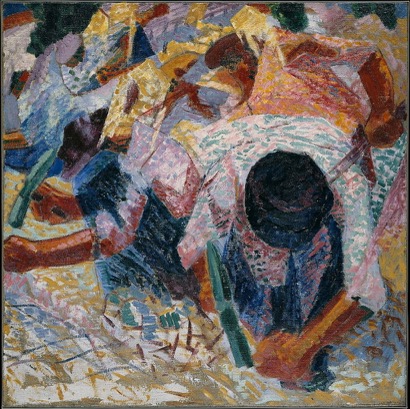
Umberto Boccioni: The Street Pavers (1914)
" … a place to celebrate recent accomplishments while my next grand obsession lurks in waiting."
I caught myself Puttering yesterday afternoon, after I'd finished screening those long two cubic yards of compost and working it into the soil. That composting effort had consumed two full weeks, since I was also breaking up planting beds, which required much weeding and digging. I felt as though I'd really accomplished something but felt at loose ends. I couldn't quite bring myself to just surrender to sloth upon finishing. I mended a troublesome hose connection and read the installation instructions for that fancy hose caddy, though I concluded that the hose caddy probably constituted a full project and not a proper focus for Puttering. I watered the garden and got the little fountain there working. I hammered an old length of rebar into a rose garden corner to prevent the hose from dragging through the bushes, then I sat and watered some more. It had been a six week sprint since we arrived here, a race against an overly enthusiastic springtime determined to out pace planting season. I had spent most days in the yard, weeding or reconfiguring, and it occurred to me as I folded up the tarp and swept the driveway that the digging portion of our SettlingInto was ending. Time for a little Puttering.
Puttering's not hardly work.
TheLittlestLie
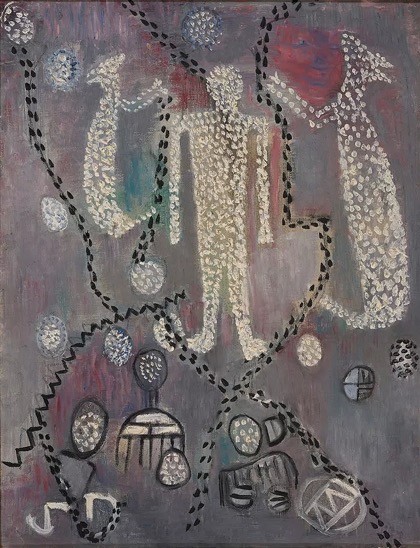
Alice Rahon: La Conjuration des Antilopes (1943)
"Whatever we decide might well rely upon TheLittlestLie to survive."
I consider self deception a high and necessary art. I doubt that I could start even a little project without believing that better-than-likely would result. I tend to jump in with both feet first rather than taking tentative steps, the better to indenture myself to outcomes. I focus upon my lost investment and force my way forward thanks to my little self deceptions. Before I'm finished, though, I usually face some reckoning, a point beyond which even TheLittlestLie can't crawl forward. I negotiate myself back into some semblance of the truth again before I can continue across the finish line, or so I tell myself. The testimony of anyone as practiced at lying as I've become should properly be thoroughly questioned. My whole life might be rooted within successful self deceptions.
In truth, I've been lucky.
TheNuclearOption

Elizabeth Jane Gardner Bouguereau: The Shepherd David Triumphant (circa 1895)
"The lion won this round."
I think of myself as shepherding our garden. I suspect that a shepherd's primary talent lies in his patience. Sheep won't hurry. They can be influenced but not through hysterics, same as gardens. Nothing replaces slow and steady when digging dirt or herding sheep. I spend most of my gardening time on my knees in penitent service to the soil which, after all, I am trying to coax into doing my bidding for the season and hopefully longer. I go after the cheatgrass first, removing every trace of rhizome however deep it might run. I loosen the soil before adding compost, peat, and perlite, then I work that in as if I'm mixing cake batter. I might work each bed three or even four times before I'm satisfied enough to water in the result to confirm proper drainage. It's slow work best attempted at a steady pace. I tend to lose full awareness of my immediate surroundings when I'm in my gardening trance. Time loses meaning. I'm in no particular hurry then.
Occasionally a shepherd encounters a mortal enemy to his flock.
UntanglingWeb
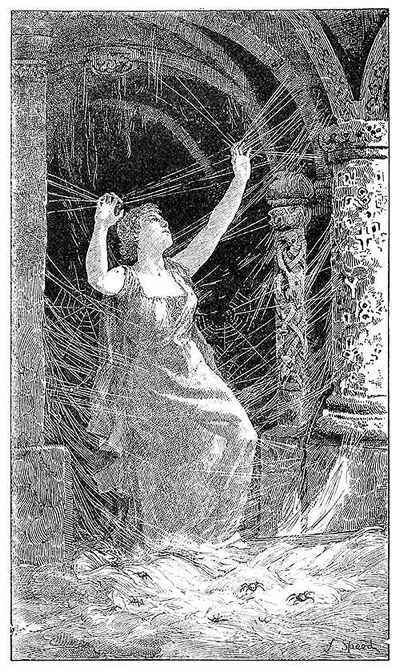
Lancelot Speed: Thick Spider’s Web, Woodcut Illustration from The Red Fairy Book by Andrew Lang (1890)
" … clear evidence that I'm successfully SettlingInto here."
I had just finished soaping myself from head to foot and stepping into the full spray to wash myself off when I spotted something on the shower floor. A spider! One of those fat jumping jobs, crouching between my feet. I thought I might have been transported into the middle of a thought experiment or one of those psychological tests intended to assess character, performed on grad students. "You're soaped up and standing in a shower stall when you notice a spider between your feet. How do you react?" I tried to protect it, but didn't turn off the water. Employing the curious logic common to those in the middle of showers, I did not for a second consider turning off the taps. I felt extremely vulnerable. The shortest distance between there and able to offer assistance seemed to run through at least showering off first and not past immediately turning off the taps before offering assistance, so I tried to stand between the shower head and the spider. The spider, for her part, had crouched down in the classic horror movie cowering position, legs protecting body from the threatening comet. I quickly washed off the soap then turned off the water.
I could not tell while drying myself off whether that spider had survived her ordeal, nor could I quite accept that I had, albeit inadvertently, caused the accident.
ImposingRhythm

Alice Rahon: Gato Nocturno (circa 1941)
"Whatever I seek also seeks my presence."
Moving in induces temporary anarchy which might well become permanent. The things I cannot find seem to rule my mind, displacing fluid motion. I move around rather than through, so much of living seems a detour. Halfway anywhere and trajectory changes, lengthening each excursion and decimating schedules. Much just happens when it happens or simply fails to occur at all. Lunches missed, suppers delayed, alarm clocks wake randomly or fail to ring at all. Catchup serves as the default condiment and dominant occupation. Hurrider going, slowing progress, with occasional glimpses of limited successes. The remaining unpacking rooms appear to be trending toward permanent mess. Some stuff seems destined for cordoning off, boxes of unmentionables and unthinkables better left for Pandora to sort through. Early days limp by.
Later, shards of schedules emerge to suggest nascent rhythms, different tempos for different tasks, but with an increasing sense of fitness for purpose.
DejaRue

Enrico Scuri: Euridice recedes into the Underworld (19th century)
"The Muse and I continue SettlingInto our fresh Eden At The End Of One Curious Oregon Trail."
The Muse and I spent the day seeking without finding much reassurance. We were visiting Portland, the city we'd left twenty years before, after we'd realized that we'd very likely never be able to buy a Villa Vatta Schmaltz there. My folks were aging and I imagined that moving close might be of some help to them and also reconnect me to my broader family. Whatever the excuse, we found a suitable house and our meager offer was accepted. We'd purchased our very own money pit and home, one we'd come to love both in spite of itself and because of what we'd done to it. Though we'd be exiled from actually living in it for twelve long dog years—a lifetime, really—we'd one day return to attempt SettlingInto again. Not so with Portland, for we'd abandoned the place as essentially unlivable for us, but we still relied on it as a source of supply and occasional reassurance. Portland had died for us, but we'd still return and try to resurrect it for a long weekend and to visit grandkids, my son and daughter, and old friends and suppliers. Saturday morning had always shown Portland well and left me feeling proud to be a part of it, but with This Damned Pandemic and last year's riots, it stands as hardly a shell of its once energizing former self. I felt every bit like Orpheus attempting to revive Eurydice, and every bit as successful.
The old reliables either exist no more or are closed pending recovery.
MonauralTyping
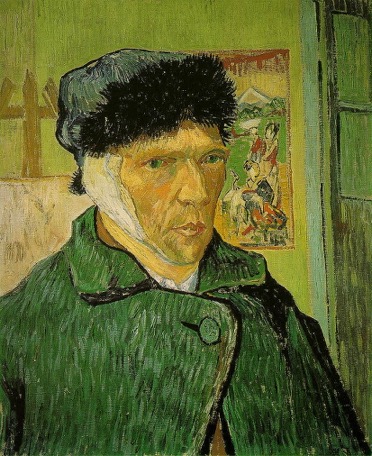
Vincent Van Gogh: Self-portrait-with bandaged ear (1889)
"I pray we could all be so lucky."
A well-weathered Truck Repair sign appeared on our left as we entered the tiny crossroads town of Biggs, Oregon, dragging what was left of Elizabeth's (our SecondCar) front engine splash guard, which had been rudely torn loose by a traffic cone thrown up by the semi-truck traveling just ahead of us forty miles back. That splash guard, a PVC plate intended to protect delicate under engine parts from road splash, had finally broken loose with a disturbing clatter ten miles earlier. We'd pulled onto the freeway verge to find the guard hanging my a single connector. The Muse suggested that if we just kept driving, it might fall off all by itself, and after considering our location, we agreed to slowly continue our journey. We were nearly ten miles from the tinier town of Rufus, which might have a mechanic. At slowed freeway speed with fourways flashing, the plate seemed capable of floating above the road surface so we rattled into Rufus, but found no mechanic waiting. I took this opportunity to limp down one of the few remaining sections of the original Columbia River Highway toward Biggs, where, I reasoned, a mechanic might await our arrival, since, as the name implies, it was Biggs, small but bigger. As we entered the town, that sign appeared.
I slowed and turned off onto a rough gravel side road, dragging that plate once it lost lift as we slowed our speed.
Lyzdexic

Leonardo da Vinci, Annunciation (1472)
"I'd honestly rather be nobody else but me, even if I cannot always reliably remember how to spell anything."
I had a few spare minutes, so I decided to stop by the library and register for a library card. I'd read the prior week that our little library had finally opened again after more than a year closed to visitors and it sits only a few blocks from The Villa, so, why not? I found a parking place in the shade and walked up the hosta-lined path to the back door just as if I was family. I found the door locked. I studied the Covid-19 compliance sign several times, each reading leaving me baffled. The sign clearly stated that the library was open between nine and seven and it was twelve fifteen. I tried prying open the doors, certain some mechanical failure had just locked me out. I read the sign again, reaching the same conclusion. Then, a woman opened the door from inside and asked if she could help me. I told her that I just wanted to register for a library card and she replied that the library was presently closed, but that I could come back after 1pm and fill out the form then or I could complete it online anytime. I told her that I would fill out the online form, though I already knew that I would not be able to complete it. I looked at the sign again and that time, it clearly announced the open hours of one to seven, not nine to seven. It seemed as though gremlins had just played a trick on me. Later, attempting to complete the online registration form left me stymied, just like most online forms leave me. I'd have to register in person later.
I bought a new lawn mower this week.
Haircuts
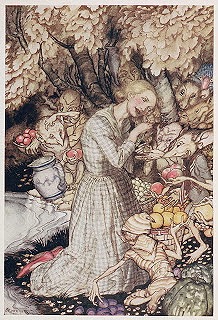
“You have much gold upon your head,”
They answer’d all together:
“Buy from us with a golden curl.”
She clipp’d a precious golden lock,
She dropp’d a tear more rare than pearl,
Then suck’d their fruit globes fair or red:
From Goblin Market by Christina Rossetti
Illustration by Arthur Rackham for 1933 edition
"Now they want to sell me product."
I feel fortunate to have been raised in the fifties. Yes, I remain painfully aware of how down right backward we were then, but we still had barber shops. Now, we might be waking up, but we seem surrounded by salons and stylists rather than barbers. For many, this evolutionary shift seems welcome. I, myself, have preferred the more artistic hand of a competent stylist over the clipper-wielding barbaric barber, but things have gotten out of hand. Finding a competent stylist remains a daunting challenge and once found, definite loyalties take over. As with many trades, the best have full schedules and only reluctantly accept new clients, though wannabes appear in legions. One cannot tell upon first encounter whether he's lucked into a skilled one or a pretender, though certain tells suggest. SettlingInto demands that I find a competent stylist, but nobody can push the sort of happy accident this entails. It's at best a random walk at first.
I should explain that I do not like getting haircuts.
Worlds

Godefridus Schalcken: Young Boy, Dressed in a Blue Robe, Holding a Lighted Torch (1692)
" … I return to my world, which I never left, to dream my own dreams by myself …"
E Pluribus Unum—out of many, one—the motto of these so-called united states, has always seemed a troublesome notion to me. I see great and often glorious variety and wonder what benefit homogeny might bestow. I take some pride in remaining unclassifiable, a lone wolf, a member of no uniform group, unwilling to become a member, as Groucho famously grumbled, of any group inviting him to join. Further, it seems to me that we do not, as widely insisted, share a world, but that we each inhabit a world, indeed a universe, unique to us. I admit to considerable overlap, swarming recursions of Venn diagrams, but that for each, the resulting world seems unique to each, and not nearly as shared as might be naively presumed. The difficulties of life shift if we presume great difference rather than essential similarity. No One Best Way could possibly prevail. Charity might spring from understanding that we're each inescapably isolated and not part of some presumed larger whole, and never could be. We might have motive to come together if we understand that we're inescapably apart and isolated. Out of many, regardless. We inhabit Worlds together, not a single place.
My history seems different from yours.
DiastolicDays
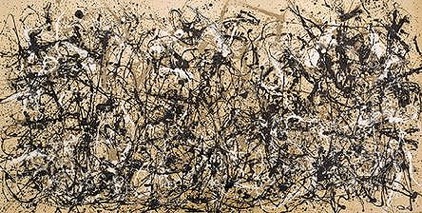
Jackson Pollock: Autumn Rhythm (1950)
"It took me more than I took it."
Every once in a while I rediscover that I was not born a machine. Each rediscovery seems original, like this essential dichotomy had never before occurred to me. Following each revelation, I quickly slip back into another flowish state, only to later be rudely awakened from it again. I progress in such fits and starts, as if I had not quite mastered my clutch pedal. I haven't mastered much. I might reach out with enthusiasm, but I tend to eventually overreach, never certain when enough amounts to enough. I prefer to exceed my own expectations, or try to. I make optimistic plans, which might be the best way to disappoint myself in actual execution. I have never been a reasonable person.
I know I've exceeded my design capabilities only after exceeding them, and the cues usually fool me.
MuckingUp
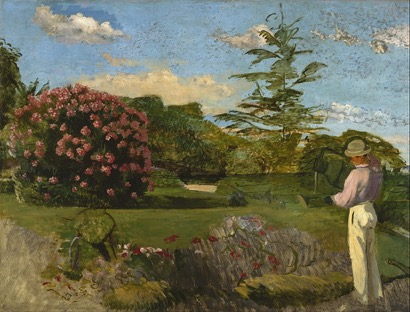
Frédéric Bazille - The Little Gardener (1866-1867)
"I feel most myself when I'm immersed within that alluring somewhere else."
I emit a sound very similar to that expelled by an Olympic weightlifter pressing five hundred pounds whenever I stand up after a long day gardening. This groan does not accompany any particular discomfort. I'm not in pain. I feel a little stiffness in my back, sure, but I feel more grateful for than regretful about this sensation. It means something. My muscles, too long accustomed to exile's idleness, seem to be waking up and they ache with satisfaction. I cannot seem to help myself. My right hand, the one that wields my hand plow, goes a little numb sometimes, but quickly regains sensation. It has yet to hamper my two and a half typing fingers. Normal neuropathy. I filled the enormous yard waste two-wheeler about a half hour after last week's collection and I have at least a half bin already backed up for next week's load. I'm dumping some yard waste in with the regular garbage just to rid myself of it. I some days prey for a pickup.
I fancy myself an old fashioned gardener, my one more recent concession having been an electric mower which I've been borrowing. I remain still frozen at the prospect of actually owning one.
ByThePeople
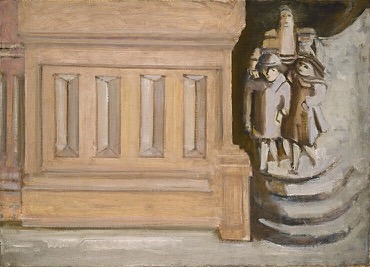
Mark Rothko: Street Scene, (1937)
"Who said I don't need to?"
Marble staircases soft as butter underfoot reveal a modest interior. Modest yet massive, as the stone lends its cold gravitas to this public place. Delicate glass shades gilded fixtures. Our county courthouse was built by public subscription. Individuals pledged personal funds to erect it back when boosterism amounted to expressing personal pride of place, of ownership, and a confidence that this corner of the state really would become something someday, that, however otherwise unlikely, we'd eventually grow into feeling worthy of this space. I'm still working on that last part. Before it became popular to perceive a government created by we, the people, as a nefarious other—a self-revulsion difficult to contemplate—we sought to unite us, however ineptly, and sometimes succeeded, this wedding cake building stands as a monument to hopeful optimism.
The Muse and I are registering to vote.
LittleThings

Behzād: Yusuf and Zulaikha [Joseph chased by Potiphar's wife] (1488)
A Persian Miniature- A LittleThing
"The lovely Beaux Arts theater stands empty but still as beautiful as it ever was."
No Colossus of Rhodes guards our harbor. Heck, we don't even have a harbor. At night, the first evidence that you're approaching a small city tends to be the lights glaring up from the penitentiary, which produce a false sunrise on the eastern horizon all night long. During daylight, a vast debris field of derelict train cars surrounds two long-abandoned grain elevators. A single tall-ish tower of a building looks out of place beside blocks of much shorter structures, some dating back much more than a hundred years, but many evidence that the fifties and sixties passed through here and set down roots. A few motels flank the few exits from our short miles of four lane designed to route traffic around rather than into here. The welcome seems less hostile than indifferent. Few cues immediately suggest that this place is different from any other dusty western city. The differences lie deeper, within LittleThings.
A local college whose sports teams were until recently called The Missionaries maintains the obligatory Gothic architecture section of town.
ComingTrue
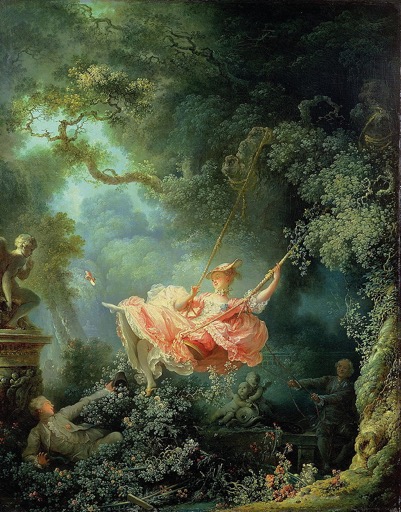
Jean-Honoré Fragonard: The Swing [French: L'Escarpolette],
original title The Happy Accidents of the Swing
[French: Les Hasards heureux de l'escarpolette]. (c. 1767)
"I hope that I never successfully catch up to anything but continuing pursuit."
Few experiences seem so damning as a decent blessing. Give me a dream ComingTrue and a raft of childhood training kicks in, lessons cautioning about hatching chickens, gift horses, and turning worms. The subtext of all of them seemed to focus on the inevitable fickleness of fate. Good luck prefaces bad. Success breeds failure. Lucky streaks end. Eventually, we're all damned. My parents were no pessimists, but they'd lived through The Great Depression, experiencing how wishing doesn't always make things so and just how cruel life can sometimes feel. They'd counsel us kids to never prop our hopes up too high. I guess they were lovingly trying to prevent us from injuring ourselves when (not if!) we fell. The lesson I took away told me to stay low to the ground, not precisely crawling everywhere on my belly, but by all means, staying off high horses. It probably didn't help that when I was five, a neighbor invited me to ride her enormous horse, which I promptly fell off of. We ultimately teach ourselves life's lessons, often by misconstruction.
I should not feel at all surprised if I instinctively duck when I experience good luck.
MistInformation

Caspar David Friedrich: Mountain Landscape
[Felsenlandschaft im Elbsandsteingebirge] (1822-1823)
"Our truths seem no more self evident than they were ever the truth."
I reckon that about half of what I believe might well prove false over time. My reckoning does not resolve the underlying errors. It just keeps me watchful. At any time, new information might undermine one of my more fundamental beliefs. I release these with little evident elegance, usually by means of mentally kicking and screaming in denial before relenting. I do not always relent. Consequently, I live beneath a true patchwork of notions, some fact-based and most perhaps firmly rooted in emotions. I hold my convictions, some more lightly than others, but my belief system, probably like yours, stands like a teetering house of cards. My cognition, the order-making part of my orientation, rarely questions the basis behind any of my beliefs. Most might well be little more than mist, but they still work for most intents and purposes. I'm prejudiced and I know it, though I only rarely ever feel anything like a brunt of its effects. I'm no scientist, no professional skeptic, no cynic, neither. I hold my truths as self-evident, even and perhaps especially the ones which never really qualified as truths and whose self-evidence only works when I'm not trying to explain them to anyone, even myself. I probably base about half of my of understanding of this world on MistInformation, perhaps much more.
I do not feel especially cursed by my condition, but mostly more blessed because of it.
Pariahing

Henry Fuseli: The Night-Hag visiting the Lapland Witches (1796)
" … we'll show them and harm ourselves."
An appalling ineptitude has taken over the delicate art of Pariahing, the practice of fulfilling the many duties and responsibilities pariahs have been called to practice throughout the ages. I write this morning to clarify these expectations by enumerating the many shortcomings I've been noticing of late. Our recently unseated President, who might have better exemplified pure pariah had he been better informed in the details of his chosen profession, stands as perhaps the prominent example of how Pariahing's not to be done in practice, for he blundered his golden opportunity and encouraged a raft of fresh but sadly inept pretenders into this delicate profession. A decent pariah remains first and foremost unaware of his designation. One cannot simply mimic and expect to get away with the performance. I cannot over-stress the ultimate importance of obliviousness, for this one element seems key. One must never suspect that they are the pariah everyone's whispering about. Deliberate Pariahing's an oxymoron. Still, even the oblivious seem in need of a little coaching and I will attempt that task here, though I understand from this outset that it's very unlikely to do any good and might render me into the pariah I'm coaching.
My heartfelt reaction to the recognition that some held me as a pariah was, as it properly should have been, denial and deflection, for I could not bring myself to believe it.
SoapOperaing

Henry Fuseli: Oedipus Cursing His Son, Polynices (1786)
"I try to remember that they're just as actively making up stories about me …"
When we were in exile, The Muse and I received periodic updates on the ongoing soap opera back home, though we were only rarely cast in any direct role in the performance. We could watch, amused or critical, from our distance and tisk or cheer as each summary inspired us. We lived, I guess, as relative gods there in that we could do little more than sit on our cloud and watch the play unfold beneath us, and we experienced a distinct beneath down there, for we were above those freys. Not that we were any better than any of the direct performers, but we could watch with unavoidable detachment. Of course we imagined that had we been there to exert influence, some of the more tragic outcomes might have been avoided, but we dared not dwell on the guilt we might have felt at missing the performances without sacrificing our already tenuous sanity. Being away's hard. Harboring begrudgement about it, only worse.
Returning, though, we're immediately cast into more active roles in the ongoing passion play.
FortuneTelling

Eugène Delacroix - Lycurgus Consulting the Pythia (Circa 1835-45)
"I'm reaping precisely what I've sown."
Moving injects mystery back into a life. Like shuffling a deck of cards, the mere act of boxing up possessions transforms them into both more and different from whatever they previously seemed. Perhaps the act of boxing increases their potential which, through continual proximity, had before grown narrow and familiar. The labeling helps amplify the mystery. In a packing frenzy, we did not provide the most descriptive possible labeling, choosing to broadly classify contents and likely target room within which they belonged. Quite a few of the boxes contained contraband which could not quite qualify as kosher according to a stricter reading of our agreement with the movers. Prominent among those were the contents of the many, many boxes simply labeled Basement Pantry, for they largely contained home-canned jars of various provisions: Our precious tomatoes and their variants, roasted, nectar, and juice; My sacred stocks: goose, chicken, veal, and beef; The Muse's jams and jellies: Mirabella, apricot, apple, and apple butter; along with various and sundry leftovers from my over-large batches of beans and stews: pease porridge, pork and beans, green chile chicken stew, and quite a few never properly labeled quarts which appear to contain barf.
These boxes sat for a month moping outside our basement pantry, an unheated corner of the venerable basement featuring crooked wooden shelves, crumbling concrete walls, and a perfect year-round wine cellar temperature.
Reclamating
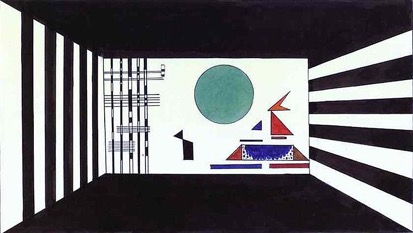
Wassily Kandinsky: Picture II, Gnomus.
(Stage set for Mussorgsky's Pictures at an Exhibition in Friedrich Theater, Dessau) (1928)
" … we're encased within this richer story …"
I say nothing profound when I reflect that we came to reclaim a home that was no longer here. We'd helped make it disappear over our long exile years. I'd returned one spring to strip the exterior to bare wood and repaint, with considerable help from my brother, his now deceased wife, and several other family members and friends. We replaced the clunky old furnace in abstentia, long distance, and by all appearances, were somewhat taken advantage of by the contractor, though our air conditioner could probably cool a typical open air baseball stadium. We replaced the roof and relocated gutters and removed and repoured front sidewalks and steps. We returned to "help" remodel the kitchen, six weeks of surprise and discovery resulting in a uniquely satisfying space. Amy's son Graig completed a thousand improvements, sometimes in lieu of paying rent and sometimes because he just could not bear not to do it. He replaced living room floors with lovely vinyl planking leftover from our venerable local hotel's remodeling. His partner Shar painted walls and worked the gardens into something far more sustainable than what we'd left. Though we're undoing some of their changes, the bones of the place are different. I keep bumping into remnants of the former place as we reinhabit what's left of it.
My legs remember the cadence of the stairways, the basement set completely different from the grand set sweeping up to the second floor bedrooms and offices.
Eatin'Grass

Wassily Kandinski: Mild Process (1928)
"Ah, progress!"
I feel proud to report that I have become a master at another immature technology. Immature technologies seem to find me and I reliably imprint upon them, losing any prior ability to get along without them. I come to depend upon them in symbiotic ardor though they never mature beyond the point where they work in any way reliably. I won't mention the most prominent of these, our ever-humbling internet, for its become too ubiquitous to warrant even a passing mention. Today, I want to explain my relationship with the ever-humiliating weed eater, a garden implement of sorts which has never once so far in its surprisingly long history, lived up to its promise or its promotion. It was a brilliant idea which was apparently never destined to grow into a viable product yet still somehow managed to become ubiquitously popular. Everyone's got one and everyone figures that they're the only one who never quite figured out how to use it. Mastery of such machinery can be tricky because it does not translate into the usual fluid use of it, but demands a more Zen-like acceptance of its inherent limitations. Mastery means accepting such technology for what it is, not what it could never become, and humbly continuing to engage with it anyway.
The weed eater, one of the very few powered tools I allow in my garage, seems simple enough on the surface.
Momenting

Attributed to Ridolfo del Ghirlandaio: Allegory (circa 1498)
"What's left seems immediately lightened, but only because it is."
Back when I was still trying to teach people how to manage projects, interested clients often asked if my work scaled. They'd seen it work with a small team, but they hoped that it might be distributed more broadly. One prospective client proudly proclaimed that he had 33,000 people who desperately needed whatever it was I was offering. "Does it scale?" he asked, without even the barest hint of irony. I clearly recall how much I wanted to reply with a sanguine, "Of course," but, of course, I could not. I'd never attempted to mass distribute whatever I dealt in. It had not occurred to me even though I'd been exposed in business school to the cherished notion of mass production. I was not dealing with widgets, but more personal stuff. Some clients wanted me to train their trainers to broaden exposure to my ideas, but the trainers they presented for training carried medieval notions of their role, most firmly believing that they would be passing knowledge rather than encouraging individuals who probably already knew much better than any trainer ever could just what they needed to succeed. Mass distribution works best when filling empty boxes. I ultimately came to accept that my only ethical response to the scale question was some variant of, "Of course not."
Science, too, struggles with questions of scale.
WeeHours

Henry Fuseli: Titania and Bottom (Circa 1790)
"A single white feather floats down into the yard …"
I follow my cell phone's light down the stairs, careful that I don't disturb The Muse with glaring or trip over one of the cats, who appear like phantoms, hopeful for treats. My day has started. I reset the furnace and put on a coat, for this old place grows chilly overnight and it takes a while to warm back up. I distribute kitty treats, usually on top of the kitchen table. A bad habit, The Muse insists, but one I feel no urgency to break. I find a seat by the tall front window looking out into the street and the T-shaped intersection that violates every possible feng shui principle. There's never any traffic. The street light sheds more light into my eyes than down onto the road surface. The cats will shortly join me staring out into the not yet morning. Two or three hours stretch before me, time before The Muse gets up when I am the undisputed master of this small universe. I read through the papers in response.
An hour later, sun still not even hinting at ever returning, I set aside my papers.
Thwartal
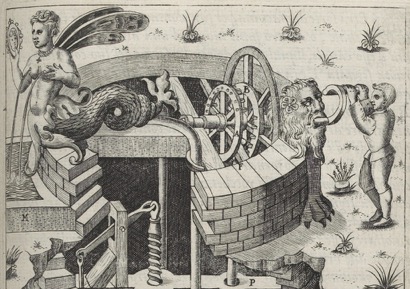
Illustration from Agostino Ramelli’s Theatre of Machines (1588)
"A moment of reverent silence in homage, please."
Thanks to recent advancements in technology, I yesterday renewed a prescription in a mere three and a half hours. The process fully respected my need for privacy and also afforded me the opportunity to catch up on some reading, as I spent much of the time waiting, on hold. A so-called portal stands as the centerpiece of this marvelous system, for it serves as the sole access point for contacting my primary care physician. Should I need to send my nurse practitioner a message, for instance, I need not simply send her a message but rather I'm directed to log into the portal and send it from within there, where editing software apparently lifted from an early prototype of an actual online text editing system circa 1993, awaits my request. From there, my message, theoretically, will be easily routed to the practitioner's queue for review and response. The whole deal depends upon my logging into the portal. The sole design flaw seems to be that the portal makes it impossible for me to log into it due to technical limitations like it just does not work. I usually just call and explain that the danged portal denied me access again and attempt to leave an actual message with the practitioner, and this tactic sometimes even works, though not always. It does work considerably more reliably than does the portal, which I appreciatively refer to as The Thwartal.
The Thwartal exists for the apparent purpose of denying users access to it.
HomeComings
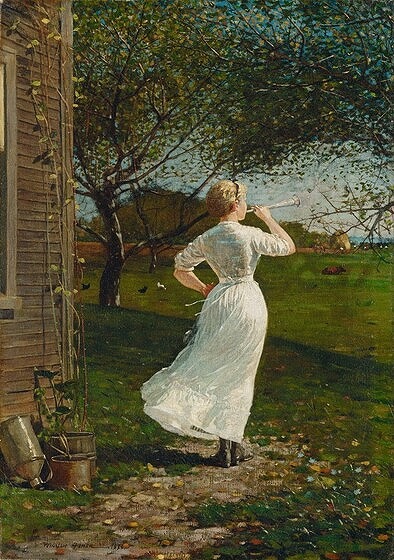
Winslow Homer: The Dinner Horn (Blowing the Horn at Seaside), 1870
"The rest of that return trip flowed like liquid chocolate …"
The first arrival, that homecoming accompanied, if only in my head, by a small parade and speeches, sure seemed like the true arriving. A Pilgrims at Plymouth Rock sort of moment, but reflect for a second on just where those pilgrims landed. Not in a familiar neighborhood, but on a rocky and unpromising, utterly alien shoreline which they only intended to call their home. It was certainly not their home yet. They hadn't earned any right to claim ownership except for the fact that its then current inhabitants didn't believe in ownership. They were into stewardship instead, and generations of their people had earned the right to call it home by dint of more than their presence there. I imagine that later, ten years on, a pilgrim left to conduct some business back with the backers in England and, upon returning, experienced more of a homecoming, the first of a likely succession of them replayed wherever leaving then returning again. Homecoming sort of requires a home to come into, and cannot be rightfully claimed or experienced until returning after an absence.
And so it came to pass, that after three weeks of SettlingInto, The Muse and I left to visit family over the weekend.
Hotel

Edward Hopper: Hotel by a Railroad (1952)
"Hostility demands so very little of us other than that we swallow hard, bear it, and tip it a fiver."
Though I've stayed scores of nights in dozens of hotels, I retain romantic notions about them. They're largely unrequited. I've spent sleepless nights in spare flophouses and also in four star suites and have found their similarities more prominent than their differences. Some rooms barely qualified as closets and others had the bathroom down the hall, but all seemed more similar than different, each of a common class. Hotels proclaim themselves The Hospitality Industry, but they might more truthfully advertise themselves as comprising The Hostility Industry, for a certain disdain for guests seems common from marbled lobby operations to caged-in cashier joints. I suppose this result eventually just comes with the territory. Prolonged proximity to humanity can sour optimism with a seemingly well-earned cynicism, I suspect. Everything has a price and that price tends to be set at about two and a half times the going rate elsewhere, due to unavoidable hospitality charges and largely well-founded preemptive presumptions that the typical guest holds no reasonable recourse, not to mention municipal fees and taxes. Dollars and fivers exchange hands in surreptitious silence as bags are carried and taxis called. They "Sir" me an obsequious lot. This leaves me feeling more suspicious than welcomed.
For those who strive to inhabit a pedestal, I suppose hotel living's a dream come true.
Patriarching
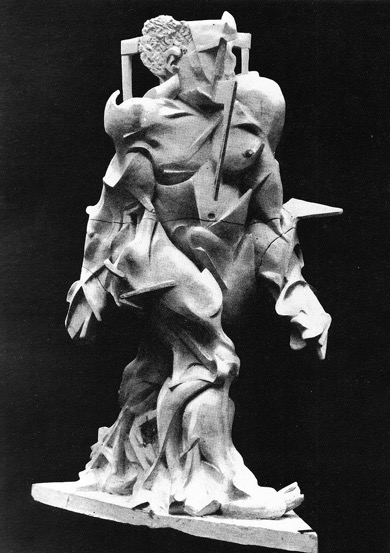
Umberto Boccioni: Synthèse du dynamisme humain [Synthesis of Human Dynamism] (1913)
"Agelessly aging."
No formal course of study prepared me to fulfill this role, though a lifetime of distracted observation seems to have at least prepared me to recognize myself cast to perform in it, however otherwise unprepared I might feel. The prior generation gone, I remain the last male standing. Father and father-in-law passed, I'm now the one who drives to Portland in an old person's car to see his offspring and his children. I'm the one staying in that hotel. I'm the one charged with imperfectly remembering when. It's my head shaking when noticing that another something's gone to Hell. I'm the one bemoaning the incessant gentrifying that chased away the innocent city that once used to be but stands no longer. I insist that an actual shark, teeth gleaming, was driving that shark car to utterly disbelieving but secretly appreciating grandchildren. I'm the guy who's funny but seems sort of unreliable. I speak of far away places nobody else can really relate to. I've earned a certain respect, I suppose, if only by dint of my longevity. I speak with an expected hollow authority. I drive like a hayseed.
But Patriarching's no insignificant thing.
FutureTension
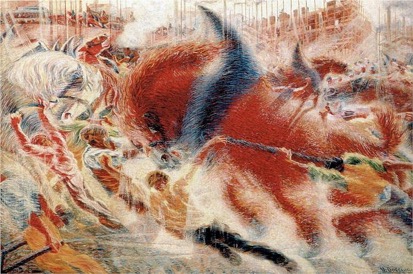
Umberto Boccioni: The City Rises (1910)
" … such issues get "disgusted," a pitch perfect description of the human condition."
A subscription to the local paper seems essential to life in this small city. I've long written letters to the editor, engaging in a decades-long arm's-length conversation with my fellow citizens, some of whom complained when they published my letters sent from Takoma Park, Maryland or Golden, Colorado, but the editor explained that I am a hometown boy. The letters run from apparently originally scribbled in fat crayon by someone unfamiliar with the difference between more and fewer to third person twice-removed scolds from retired college professors. All letters are welcomed and almost all published, though they rejected my back-handed ode to Gerard Manley Hopkins "I Think That I Will Never Know Anything As Lovely As A Light Pole" written to complain about the power company savaging our lovely trees. I rewrote it as rhyming prose and in it went. I probably qualify as a frequent offender and feel damned proud of my contribution to civil discourse and exasperation. I take particular pride, like many submitters apparently do, poking at the other side, though I prefer a certain subtlety when I chide. The outright attack shows little tact and probably fails to impress or convince anyone it's actually aimed at. I prefer a certain humbly-professed ignorance as if I didn't actually know best, though I usually believe that I do know better than the fat crayon folks.
Most days, the paper features three or four fresh letters.
Filament
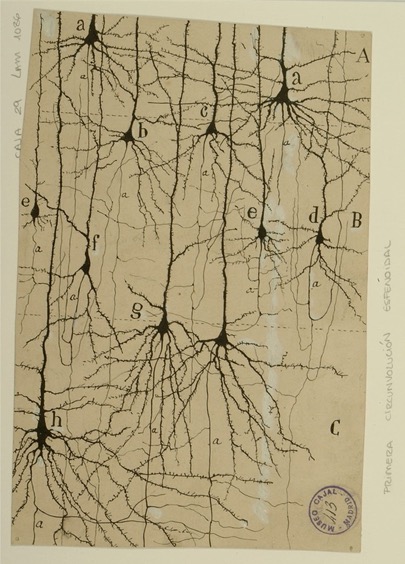
Santiago Ramón y Cajal: Sphenoidal cortex in a 25-day old infant (circa 1929)
" … it probably well-serves us if we can supplant our desire to know for certain with at least a little continuing faith."
In a perhaps apocryphal account of Edison's search for a workable Filament for his envisioned light bulb, his research team investigated around 6,000 substances, many of them carbonized, ranging from bamboo into complex metal alloys. His research involved engaging in an almost infinite search destined to almost always disappoint. I suppose faith in his envisioned outcome kept him going, that and a certain hubris he was well known to possess. Our SettlingInto has taken on similar proportions as we try on various alternative arrangements of our same old possessions, none of which seem immediately correct. Our faith—in turns flagging and surging—in ever finding that perfect combination fuels us forward. All infinite searches must be faith-based initiatives. The old advice about simply envisioning a future then moving toward it guided by mysterious Laws of Attraction amounts to aging New Age claptrap and probably hurts much more than it helps. Infinite searches, those engaged in within innumerable emerging parameters, cannot be successfully concluded by either hope or rigorous method, but probably only by means of Happy Accident, like Edison's Filament discovery most likely was.
Happy Accidents seem invulnerable to engineering discipline and rigorous process.
Staying@HomeSyndrome
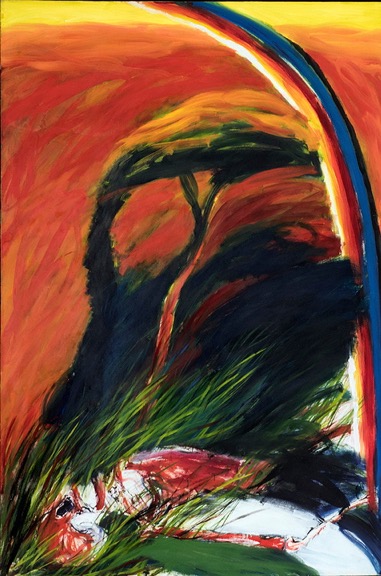
William Crozier: Rainbow's End (1965-70)
"I'm taking my mask and hand sanitizer along for reassurance."
In April 1952 in Asheboro, NC, John Phillips, an eighteen year old black man, was arrested on sexual assault charges. Sent to the state mental hospital, he was classified as a "moron" with the mind of a seven year-old child. His lawyer entered a guilty plea and a judge sentenced him to life imprisonment. By 1991, Philips had become the state's longest serving prisoner and his family and inmate rights' groups were lobbying for his release. Interviewed more recently in prison, Philips insisted, "I ain't going nowhere. Too many fools out there." He had become that rarest of rare exceptions, a prisoner who refused his own freedom. I relate to him this morning.
Today's the day I've waited for since fourteen months ago when I first entered sequestration from This Damned Pandemic.
OverDoing
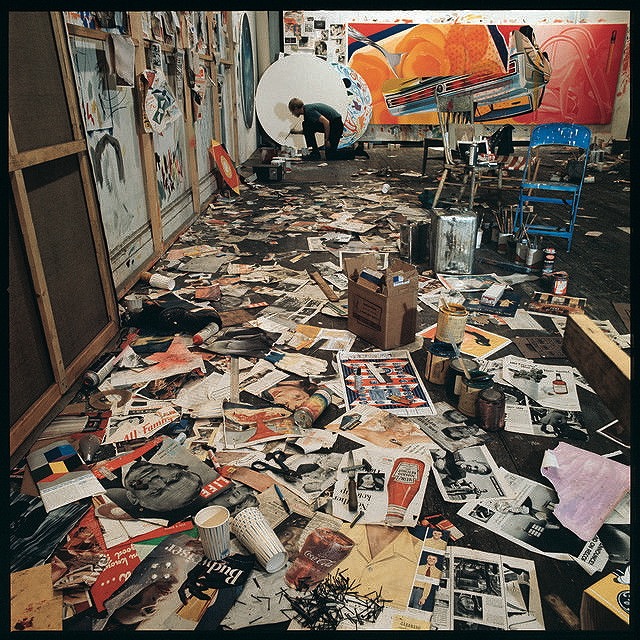
Ugo Mulas: James Rosenquist, New York (1964)
"What other choice have I got if I want to develop good judgement?"
My enthusiasm easily overwhelms my ability. I imagine a task completed and, thanks to decades of training and experience, I hold the self-discipline to see that task through to completion without noticing that I might have been OverDoing. I'm rewarded by an aching back and an unwanted slack day as I recover from the self-inflicted injury. Nothing serious, just the usual products of excess: achy back, swollen hand, gripy knees. So much demands doing and I've been aching for years to engage, though a man my age might not expect to immediately bounce back as he used to. It daily becomes clearer that I have yet to develop adequate judgement to determine what's reasonable to expect of myself. I cannot quite find the rhythm of this place yet, but it's only been a couple of short weeks in unusual circumstances since we started SettlingInto. A rhythm might emerge over longer time, once I've addressed initial imperatives. Once in maintenance mode, I should be up to the challenges, or so I tell myself. I can't know yet.
An old adage insists that three instances of bad judgement produce an accident, and that the only reliable way to produce good judgement comes from surviving a few accidents.
Unmirroring
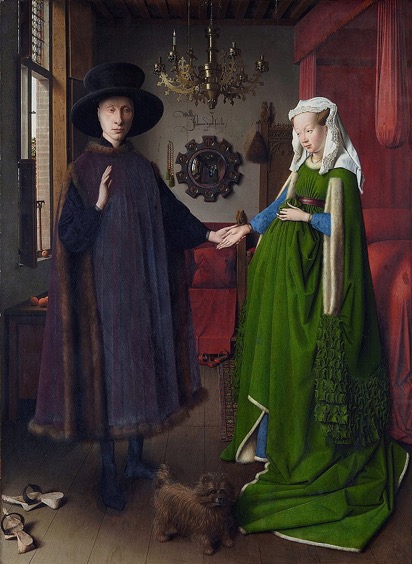
Jan van Eyck: The Arnolfini Portrait (Giovanni Arnolfini (?) and his Wife) (1434)
"Even absent mirrors reflect something."
In modern America, place has come to hold little meaning, for technology allows us to mirror many perspectives. I'm not tied to the view out my window as my forebears were, but I can choose to peek into a seemingly infinite variety of world views, though I mostly choose only a narrow array of them. Between television and the (damned) internet, I hold access to innumerable alternative realities. I might not have access to actually experience Springtime In Paris this year, but I can certainly get glimpses of the place anytime I want. Our houses sometimes seem like containment vessels more than dwellings, with mirrors and screens standing in for actually first-hand seeing anything. Fortunately, back in 1907, the designers of The Villa Vatta Schmaltz were shortsighted enough to fail to build a room fit for television, so we're still undecided where to place ours. We have not even connected the (damned) thing yet and do not miss its distracting presence. Mirrors, at the current stage of moving into, still sit in their boxes, so, consequently, I can't even gawk at my own reflected image as I move around the place. I spend considerable time looking out windows absorbing an actual sense of place, these days, a rare form of grace.
I realize that I've spent much of my life mirroring.
FutureClash
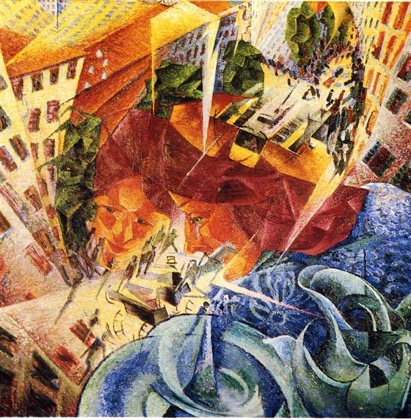
Umberto Boccioni: Visioni Simultanee [Simultaneous Visions] (1912)
" … I'll settle for what the present offers and keep dreaming forward."
Future spends most of its existence anticipating, though a few significant events find present and future encountering each other. These meetings sometimes produce sparks, for I expend little energy moderating my visions. I tend to spawn them in almost exclusively expansive forms, suspending those physical laws reserved for presents and pasts. In my future, anything might happen, and I cast even uncertainty as less of a barrier than I should probably expect it to be. I can revel there, suspended within my Utopian projections, and usually believe that my imagined future waits impatiently for my arrival. Reality, the traditional buzz-kill of dedicated dreamers, steps in somewhere to throw some cold water on the dreamer, though not even a freezing Bucket-Challenge intervention tends to blunt the more alluring imaginings.
In this culture, we learn early to firmly believe in The Future, for it seems to hold our destiny, our ultimate achievements.
StuffSettling
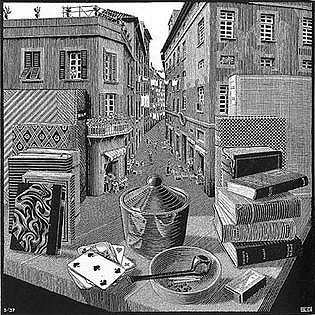
M.C. ESCHER: Still Life and Street (1937)
" … we inherit the puzzles we probably need."
The Muse and I might have forgotten that SettlingInto requires negotiating settlements, not only between us, but the stuff insists upon participating, too. This creates the most curious collaboration, for regardless of how much The Muse or I might prefer a particular placement, the stuff retains a voice, and one likely to trump our best collective judgement. This process leaves many boxes in extended suspension and negotiations continuing ad nauseam and beyond. Even should we manage to quickly place something, the stuff retains the right to re-open negotiation, making for a several stage process for some items. Many boxes represent certain contention and so are set aside to open later or never. The idea that we might quickly empty boxes and just get on with a settled life here now clearly seems out of any question. We'll be living in extended suspension as a necessary condition for ultimately SettlingInto, as our StuffSettling ultimately dominates the production.
The Muse has been installing shelf paper, by tradition her obsession when arranging a kitchen.
Stymie
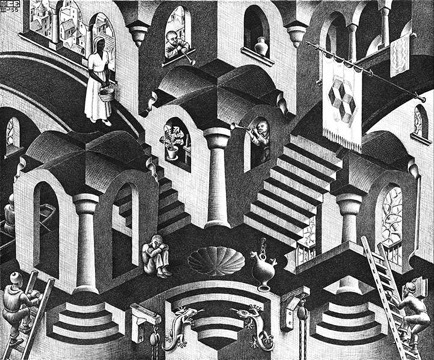
Maurits Cornelis Escher: Convex and Concave (1955)
" … fresh stories can successfully reframe even old and entrenched expectations."
The peeing boy fountain in the backyard pond, reminiscent of the famous one in Brussels, this week started exhibiting symptoms of possible prostate problems. His flow, recently manic, had slowed to an unrespectable trickle. I called The Muse's son, who had replumbed the guy during his tenancy here, and he drove over to 'splain the pipes. He introduced me to his very clever ramrod contraption and demonstrated disassembly and deployment, but the trickle persisted. Yesterday, I decided to conduct a more thorough exam, pulling the pump and subjecting all hoses to the high pressure water treatment. Each hose in turn produced more than adequate volume. I scrubbed off the slimy pump, then, in a sudden sleet storm, hooked all the parts back together. Hardly a trickle. Realizing that I'd just entered The Stymie Zone, I turned off the pump and retreated to someplace warm to dry off and consider my situation.
This was not an unfamiliar experience here, where chores roughly separate into two broad categories: those which can eventually be successfully completed and those that never will.
LastWeek

Max Klinger: The Release of Prometheus (late 19th–early 20th century)
"I wonder who I will have turned out to be after I lift my veil."
Thirteen months ago this week, I half-heartedly decided to lock myself down for the recommended two weeks as my patriotic contribution to combating The Damned Pandemic. I figured, if unenthusiastically, that it might be the least I could do and still feel as though I'd contributed to the betterment of humanity. I would not be performing any heroic open heart surgeries or volunteering to scrub ventilators in any hospital, and it would only be for a fortnight, just long enough to break the thread of infection, then we'd be back to normal. Thirteen months later, I'm still sequestering, which means I stay mostly at home, going out only when absolutely necessary or to take a sanity-promoting drive to nowhere. I've become quite the hermit since, each week extending my original two week commitment to contribute my little bit toward the continuation of our society. This might well prove to be my LastWeek under such quarantine.
I say "might well prove to be my LastWeek" because I hold the same level of certainty about the ready cessation of these hostilities as I unknowingly held thirteen months ago.
PreCycling
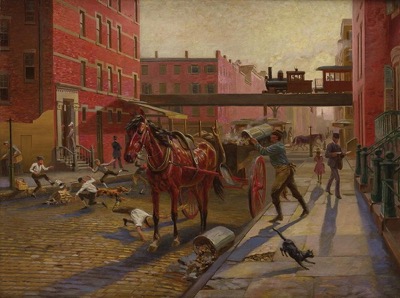
Louis Maurer: View of Forty-third Street West of Ninth Avenue (circa 1883)
"Convenience seems SO over-rated."
More than a decade ago, this small city stopped recycling glass. They first tried smashing it up to mix with asphalt to produce so-called glassphalt for paving roads, but immature technology and the incoming stream quickly overwhelmed that strategy. Now it just gets dumped into the landfill where it should retain much of its original character for centuries because it's just too expensive to ship it off to Portland's glass foundry to be melted for reuse. Couldn't each user pay a recycling tax or something to balance the market price? Since Trump bungled a trade deal with China, the plastic we used to export there for recycling and reuse has likewise been routed directly to your local landfill where it will also retain much of its original character far into the unforeseeable future. The Petroleum Institute spends millions advertising how their plastic products are 100% recyclable, but most of this nation maintains no facilities for actually recycling any of it. That plastic bottle of imported water should outlive your great great grandchildren. The primary benefit from all this landfilling might eventually become the ease with which future generations should be able to research our profligately shortsighted nature. We inhabit an out-of-sight-out-of-mind society yet continue to believe ourselves somehow enlightened.
Since relocating here with the intention of SettlingInto the place, I've caught myself changing what I purchase.
ContextKeeper

A scene (AZUMA YA: East Wing) of Illustrated scroll of Tale of Genji (written by MURASAKI SHIKIBU (11th cent.). The multi-panel curtain at the center bottom of the image is a kichō. The decorated sliding door panels at the top of the image are fusuma. The scroll was made in about ca. 1130 ACE and is in the Tokugawa Museum in Nagoya, Japan.
"Most look high into the heavens for his presence …"
In my grade school they were called custodians and wore beige mufti outfits. They manned the mops and brooms and kept the furnace fed. They kept the place waxed and spotless. They mowed the lawn and repaired broken windows. They seemed invisible, beside the point of the place, which was satisfying the solemn responsibility of educating future generations, and yet without their contributions, satisfying that goal would have proven impossible. They were the ContextKeepers, and every building, every institution depends upon them. They empty the garbage and clean the toilets and carry the keychain providing access to every square inch of the place. Not even the Senior Executive Director carries that much authority. I secretly aspired to grow up to become one of them, managing a loading dock all my own, a benevolent invisible man, utterly dependable.
SettlingInto this old house, I catch myself slipping into my role as ContextKeeper here.
GoodGrief
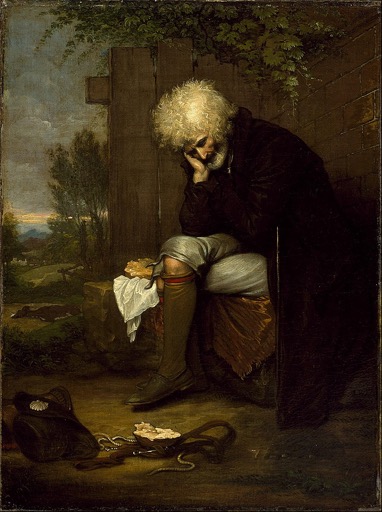
Benjamin West - The Pilgrim Mourning His Dead Ass (1800)
"I prefer to believe that it might ultimately contribute to a half-decent cheese sandwich or something."
When exasperated, Charles Shultz' cartoon character Charlie Brown would resort to his signature, "Good Grief" in response. I interpreted his comment as a mildly updated form of the classic, "Danged Nab-it," suitable for readers of all persuasions and ages, but I've more recently come to consider GoodGrief in its more literal sense. Perhaps grief, universally associated with the worst experiences, exists as an unsuspected good. There's often a huge difference between doing well and feeling good about a result, between tasting good and actually being good for you, so it seems not an outlandish stretch to wonder if grief, too, might somehow carry considerable goodness within it. If so, what distinguishes good grief from bad? How might I reap the benefits of GoodGrief and limit the damage from bad?
Grieving's personal business and, to my mind, not really open for public dissection.
Resurrection

Giovanni di Paolo (Giovanni di Paolo di Grazia): Paradise (1445)
"Resurrection seems unnecessary to bring forth any presence still living within our hearts."
From one perspective we might seem to be resurrecting the old Villa Vatta Schmaltz so that we can set about Settling (back) Into it, but we ain't doing that. The Villa of the past still resides there, I guess, but The Villa of the present only distantly resembles its forebear. Its former self was more tumbledown than the present instantiation, and desperately needed painting. The current version still wants considerable work, but we've made progress over time, not to restore it to what it once must have been but to reclaim it from the otherwise inexorable clutches of time. Houses and especially homes seem especially subject to what are known as The Ravages Of Time, but they also face The Ravages of past, present, as well as future. Earlier stewards of this place attempted updates that aged poorly. We're taking it slowly and trying to more thoughtfully stabilize this place's presence into the future. We are not now and never have been in the Resurrection business here.
We might be occupied introducing this place and ourselves to our future together.
Dirty
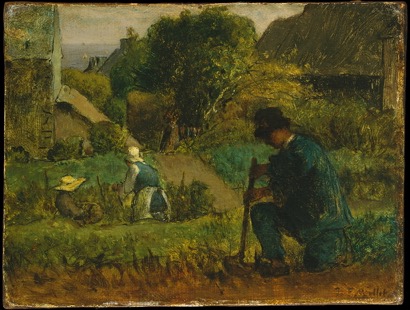
Jean-François Millet: Garden Scene (1854)
"Today seems like the day to finally get up and Dirty."
During exile, the dirt I encountered amplified my sense of displacement. My home valley was blessed with remarkable soil, Loess, the likes of which only a small handful of places in this world enjoy. Deposited here by wind over millennia, it features few rocks and little organic matter. I can pull a long-tailed button weed free from it with its foot-long delicate root intact. Water slips right through it. Improved with peat or compost, it becomes perfectly friable, an extremely fine planting medium. Elsewhere, I encountered what seemed like imposters of soil, clays and hardpan scrabbles, gumbos and shallow gravels, all exhausting, unrewarding stuff with which to even attempt to work. SettlingInto seems to insist that I sink to my knees and get Dirty for a change. In the Rockies' Foothills, I came to dread working what passed for soil. In the DC suburbs, I mixed crushed leaves with the clay to create something workable, after bending my turning fork just turning over dirt more suitable for pottery than planting. I longed for better every Spring.
Now the opportunity presents itself in spades.
Done&Done-r
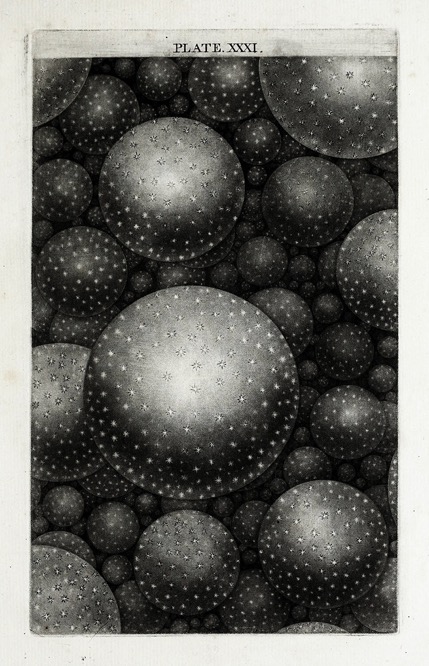
Thomas Wright: A Finite View of Infinity (1750)
"I feel reasonably confident that a fresh infinity hides in there, ready to spring itself upon me."
Both packing and unpacking fall into a unique class of human activity in that they seem to have no concluding point. A naive packer might look at a house and quite reasonably presume that packing should simply entail putting every thing within that place into a box, though that notion will prove impossible to satisfy in practice. Some items seem to have been specifically designed to not fit into any box, for instance, and others turn infinite, filling just as many boxes as one throws at them, with always a few more outstanding, ad infinitum. Flower pots pack like this. So do the contents of any typical garage. One must eventually come to some sort of accommodation with these items and acknowledge a state nestled somewhere between Done&Done-r. Insanity seems the only reasonable alternative.
Unpacking reverses while amplifying these conditions.
Fool'sMission

BARTOLOMÉ ESTEBAN MURILLO: Two Women at a Window (c. 1655/1660)
"Only idiots attempt to find themselves by mimicking another."
Baseball season begins on April Fool's Day without a shred of intentional irony. I sit in the same window I was displaced from twelve years ago, renewing my plotting against the streetlight outside. The house now filled with boxes, many holding promise and a few holding long past, utterly unresurrectable lives as Easter nears and Passover passes us by. Life sometimes seems a Fool'sMission offering nothing so much as endless opportunities for me and everybody else to make absolute fools of ourselves, just as if we already hadn't. We undertake great missions brimming over with glowing possibilities and sometimes even succeed at achieving them. Glory comes and goes like tidal action, especially success, a more demanding mistress than failure ever was, for she demands more than an odd ounce of flesh, and takes it. We're animated dust still wondering what all the fuss was about.
My darling daughter Heidi was born on this very day thirty-nine years ago today.
TransPlantings

Pierre-Antoine Poiteau: Plate 8, "Arancio di Genova", from l’Histoire Naturelle des Orangers (circa 1818)
"It's been a long time since yesterday's lunch."
Psychologist Paul Watzlawick told the story of the Stalin-era Ukrainian collective farm ordered by the Moscow central planning bureau to grow oranges. When the farmers complained that Ukraine's climate was not right for orange cultivation, the planning bureau criticized their counter-revolutionary attitude. Relenting, the farmers planted orange trees, which froze the first winter. The farmers were sent to Siberia for sabotaging The Five Year Plan. Context always matters yet plans can only be crafted out of the context within which they will be expected to execute. Planners largely presume away the differences because anticipating them either proves to be impossible in practice or implausible to overseers. We tend to create fictions, the best-laid of which initially prove most satisfying. Later, the weather will do what she always does and prove somebody foolish. Caution's rarely rewarded.
One just never knows until arriving precisely what climate they'll be encountering.
ReadinessOrNot
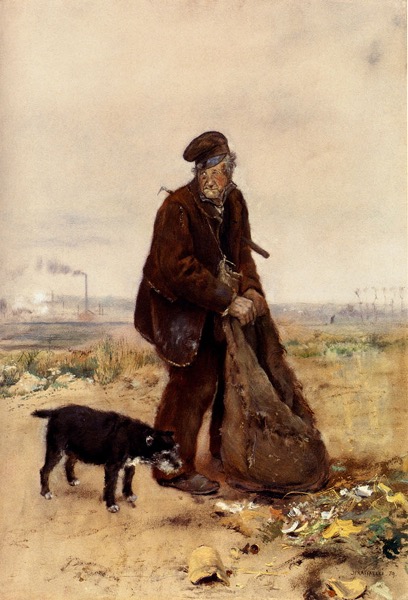
Jean Francois Raffaelli: Le Chiffonier [The Rag Picker] (1879)
" … the very nature of Readiness: Or Not."
"Ready or not, here I come," has proven the most valuable phrase I learned playing childhood games. It seems to encapsulate a critically important understanding about engaging in this world, that when time comes, it does not presume readiness. Indeed, it scoffs at it with utter indifference. Through my life so far, if I'm honest in my assessment, I might insist that I've never once felt as though I was completely prepared for anything, and yet I've more or less thrived, often sitting on the edge of my seat or cowering near some corner, but I've thrived. When a teacher handed out test papers, he might as well have spoken that fateful phrase, "Ready or not …", because test time had come. Further preparation had just become beside the point. Whatever might have come before matters not at all. 'What next' matters then.
I carry a vestigial notion that I really should be ready, though.
TimelightZone
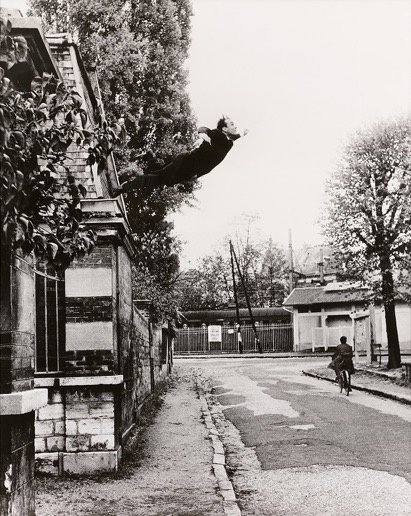
YVES KLEIN (1928–1962) IN COLLABORATION WITH HARRY SHUNK (1924–2006) & JÀNOS KENDER (1937–2009),
LE SAUT DANS LE VIDE [THE JUMP INTO THE VACUUM] (1960)
"Annonymous no more. SettlingInto."
Along Interstate 80W, just west of Ontario, Oregon, a roadside sign announces entry into a radically different space than any place east of there. I call it God's Own Time Zone, probably because I was born within its boundaries, which always amounted to pure fiction blended with both geographical science and politics, which tends to guarantee very strange bedfellows, indeed. The most conservative will wistfully recall that before The Gilded Age, these United States featured just one time zone, or, perhaps more accurately, an infinite number of them. When the sun reached its apex, noon appeared. This standard worked precisely the same everywhere on Earth, always had and presumably, always should. God's will. Ten miles further down the tracks, noon arrived a minute or so later. The emergence of land travel moving on average faster than a walking horse finally did in the old man's time, sparking a decades' long debate which was more like an international argument, culminating in the most outrageous encroachment upon human freedom and liberty in human history, the adoption of Greenwich as the prime meridian and calculating all local times relative to that baseline; mean time The French, of course objected but still adopted the standard, though declaring their prime meridian Paris Mean Time, retarded from Greenwich by 9 minutes and 21 seconds. God must love the French!
Part of Oregon protrudes into The so-called Mountain Time Zone.
OneWayRoad

Hieronymus Bosch: The Healing of Madness (Circa 1494 or later)
"We were always traveling a OneWayRoad."
This drive felt really different. Prior trips, The Muse and I carefully planned both legs, there and back again, before we departed. Then, part of my brain never lost awareness that we would soon be leaving again, that our exile would be restored after that brief respite. This time, we left with no intention of ever returning. Even Wyoming seemed welcoming without the threat that we would soon be going backwards crossing it again. Even beleaguered old Denver looked less threatening without the certainty that it would soon have us in her clutches again. Even the barren Early Spring Prairie seemed forgivable, for we were out of there forever. In the future, we will be in and out of everywhere but where we're intending to be SettlingInto. Future excursions, rather than home then back into exile again, might be no less circular, but they should center on our center rather than upon some remote-seeming periphery.
There are only OneWayRoads.
Untethering

Sir Francis Bernard Dicksee: The Funeral of a Viking (1893)
" … that familiar haunting ignorance that comes from not even caring anymore what's lurking behind that door."
Untethering must be one of the earlier stages of SettlingInto anything new. The past must be rendered irrevocably past to make room for the next story's future. Certain rituals must be observed, prominent among them refrigeratoricide, where one must, with deliberate purpose, let go of everything that had been cluttering the family refrigerator since just after the last ice age. Every damned half pint of sweet gherkins must go. So must almost everything left, except, of course, The Muse's precious jar of Maraschinos. The disposal should rightly start smoking in response. The separation of garbage and recyclable must leave you wondering what tractor beam trance had insisted upon this curious inventory. Try to save the cheese if you can, but heartlessness demonstrates dedication to The Plan. Are you deeply invested in SettlingInto something new? First trash whatever's remaining within your blackhole refrigerator first.
Our fridge had evolved to that point where nothing ever put into there could ever be found again.
CopingAgain
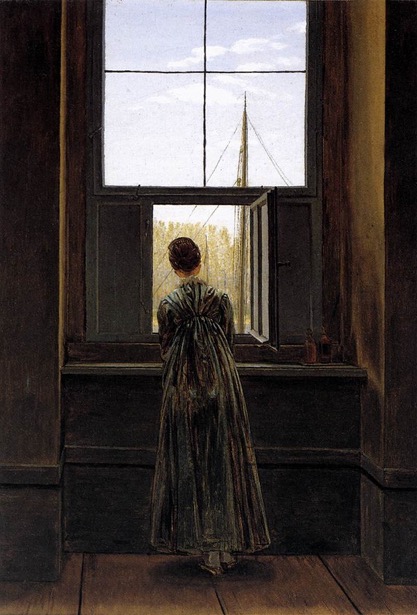
Caspar David Friedrich: Frau am Fenster [Woman at a Window] (1822)
"The past weighs more that any future can counterbalance …"
I consider Coping to be the great under-appreciated superpower and the skill underlying most of my success, such as it was. Most of what has happened to me just happened. I didn't ask for very much and yet usually received more than I imagined receiving, both good and bad. Once whatever happened, I found myself basically powerless to undo it, since the experience resided in the past by then. I used to try and inevitably fail to fix my past and never once succeeded, though the attraction to try to undo my past continues. I figure that it's an innate urge, probably a standard stupid human trick, one which almost always aches for attention but which no-one ever masters. Not for lack of trying, though. Throughout history so far, much human folly as well as tragedy seems to have been the direct result of failing to fix the past, with Getting Even and Settling Scores ranking near the top of the list of perennial failures, to the point where they fully qualify for the long list of Things That Just Do Not Work, However Dedicated The Attempt.
Coping comes in both useful and useless forms, healthy as well as self-destructive kinds.
Converging

Still Life with Peaches and Water Jar (left),
Still Life with a Silver Tray with Prunes, Dried figs, Dates and Glass of Wine (center),
and Still Life with Branch of Peaches,
Fourth Style wall painting from Herculaneum, Italy, c. 62-69 AD
"Nobody knows what might unfold …"
Times come when events commence to Converging. Common near the ending of any effort, multiple threads resolve as if by magic. A sudden flurry of activity sees synchronicity show her usually shy self and pure magic invades. Nobody complains, for we see these events as justifying our earlier efforts. What formerly might have seemed disjointed and arrhythmic finally finds its pace as well as its justification. Little things can spark this sense that the world has started coming together rather than continuing to fall apart. I notice things. Just after the moving van left stuffed full of all of our stuff perfectly squared off into a perfect cubic rectangle, I poured the last bit of my single malt and invited The Muse to join me in a toast. She very quickly concocted a Manhattan, squeezing the last drops out of her Basil Hayden. How could it have been that both bottles exhausted themselves at precisely that minute? We experienced a small Converging. Cheers!
We're heading home later this morning and I 'm up preparing myself for a day of Converging.
DisappearingAct
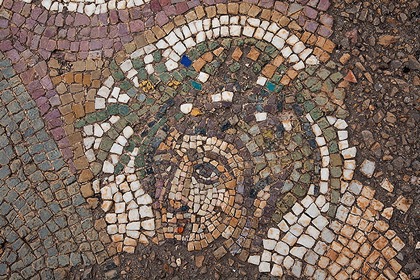
Detail of a mosaic from the Maison de la Nouvelle Chasse, Bulla Regia, Tunisia
"Nothing ever actually disappears but just changes places …"
The Muse and I have been a long time going but then we intend to be an even longer time gone. Sleep has insisted upon chasing us around the Master Bedroom until we're exhausted each evening but hasn't been staying around long enough to encourage us to wake refreshed. We move like zombies but only because we feel more undead than alive. Only the promise of someday SettlingInto seems to keep us moving ever nearer the edge of leaving, though we have not yet toppled over any precipices. Perhaps today brings respite. Maybe tomorrow, instead.
Nothing ever actually ends in a flash or flourish.
Imposition
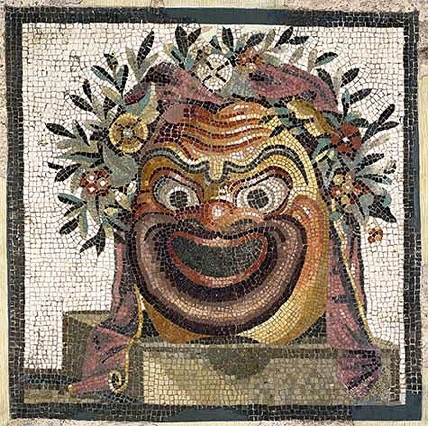
Artist unknown (Roman): Mosaic with mask of Silenus (1st century A.D.)
" … all thanks to the mysterious power of Imposition."
Just about this time yesterday morning, I confidently predicted that I would never again find myself writing from this desk while looking out into a familiar backyard cast in predawn darkness, yet here I am, feeling like a living testament to the folly of feeling certain about anything in the future. Still, I cannot quite conceive of fully embracing uncertainty as a useful manner of living. My life so far has certainly proved to reinforce the innate folly involved in executing according to plans, but it seems schizophrenic in this respect, too, for sometimes careful planning seemed to deeply influence manifesting expected outcomes. I might not have ever been able to predetermine which plan might succeed or fail, but I also never managed to become quite cynical enough to reject the possibility that some planning might prove beneficial. Unlike a few of my forebears, I cannot believe that my future was pre-determined by either a loving or a vengeful god. I ain't no Job or Midas! I also question the absolute authority of my, or anybody's, free will, which might just be a useful fiction, but useful nonetheless.
Yesterday's plan of action governing the great move-out, the grand precondition for later moving in, itself a precondition for finally, eventually, SettlingInto, fell apart with whimpers.
Lasting

Gypsy Girl Mosaic, Gaziantep, Turkey (circa 0)
" … a little richer for my Lasting."
For me, last impressions stay with me longer than first ones. My first impressions tend to get fogged by my native inattention, more distractions than information. There's just so much to see when first encountering something that I'm rarely certain upon what I should be focusing my attention. I'm the type who, when visiting The Grand Canyon, leaves with the deepest impression of some otherwise trivial something that somehow seemed special in that context, like the bathroom configuration. I remember exits, though, especially those informed by a lengthy stay. When leaving, I know what's special about a place and if it impressed me, I press my face up against the glass and attempt to peer into it, as if to capture some essence of it, just as if I could. As The Muse and my departure date approaches, I catch myself Lasting, performing that peering trick just as if it might allow me to take the best of this place with me once I leave. Yesterday, we took the last drive down Lookout Mountain Road, my go-to secret passage narrow two-lane switchback backdoor route down into Golden. It was often more convenient and doubtless the most scenic. Eighteen minutes down to the flats. I'll very likely never be back again. Goodbye, old friend. You left a Lasting impression, or maybe I was the one who captured it peering into your window.
Lastings seem the most fleeting experiences.
Unsettling

Francisco de Goya y Lucientes: Witches Sabbath (1797-1798)
As losers have long been known to sing, "Look away, look away, look away, Dixieland."
Before SettlingInto can commence, it's considered traditional if not strictly essential for prospective settlers to first survive some sort of ordeal. The old, overdone trial by fire holds little popularity in a modern world seemingly ruled by microwaves, but some humiliating experience, some sort of Unsettling, seems necessary to set a proper context for eventually SettlingInto. Our Unsettling has been manifesting in most of the usual ways, which is to say we've been showing off what we tend to do when we don't really know what in the heck to do, on steroids. What usually tend to be no more than small surface imperfections seem amplified under Unsettling conditions. I swear, The Muse can lose anything she lays her mitts on, Sharpies and tape gun most prominently, though only very rarely permanently. To lose the last Sharpie in the universe while in the midst of a genuine packing frenzy might seem like high comedy to any distant observer, but personally experiencing it feels like the lowest form of tragedy known to man. Likewise, without the tape gun, everything, and I mean every DAMNED thing, just stops working. A certain fruitless frenzy replaces forward momentum. Forward momentum becomes the whole purpose for living whenever attempting to get through any Unsettling.
I might overstate my case in favor of not losing the tape gun, since tape guns only ever work at best sporadically.
SettlingInto
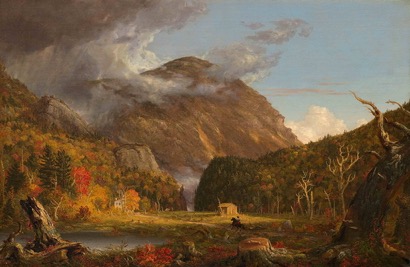
Thomas Cole: "A View of the Mountain Pass Called the Notch of the White Mountains" (1839)
"SettlingInto brings our souls and spirits into play."
Few human acts manage to feel as unsettling as settling. It seems inevitably disruptive. My own ancestors arrived on this continent in the 1620s, having bartered their seventeenth century lifestyle for something more closely resembling one common to the Dark Ages. A wattle hut, very likely hastily constructed from roughly-gathered forest scrub, probably sufficed for shelter through that first Connecticut winter or two. We now think of these people as valiant and brave, and they may have managed to become both, but they began their SettlingInto as essentially economic resources indentured to some land speculators rather than as simple, peace-loving Pilgrims. Religious liberties aside, they held deeper obligations to produce returns for rich shareholders or face ruin. They might have been seeking liberty, but only as a longer-term possibility. In the short term, they became essentially debt slaves as a precondition for their eventual freedom, so they first SettledInto fulfilling obligations, not enjoying newly-found freedoms. These duties sometimes conflicted with their high ideals, and relations with the locals only degraded over succeeding decades. Pilgrims were genuine sons of bitches when they felt that they needed to be to fulfill their financial obligations to gain their own freedoms. Little has changed over following centuries.
Taking alien country as if it was your own, even if you presumed it to belonged to God and, by divine right, was passed down to you as his agent, seems one of the more audacious forms of liberty.


